Enfield’s “Canopy” Controversy
“When I drive up the tree-lined and heavily-canopied winding road that is 327, I always know I’m coming home….”
One who commented to the Enfield Town Board on Rockwell Road pruning, June 26.

Reporting and commentary by Robert Lynch; July 14, 2024
Personal preference: I like driving Pennsylvania’s back roads. There’s an undisturbed, understated quality to the experience. Many of their surfaces remain gravel, with ruts and potholes graded away once yearly by equipment pulled from the 1950’s. Roads seldom run straight. Intersections become anyone’s guess. And most notably, the trees and stone fences crowd incredibly close to the driving lanes. Take it slow and you’ll be OK. The roads may fall short of what New York highway engineers at a Cornell School for Highway Superintendents would call “state standard.” But, then again, the Keystone State is not the Empire State.
Nor, apparently, is it the Town of Enfield.
Since mid-June, residents of our town’s Rockwell Road have voiced concerns about the overly-aggressive tree-pruning policies of the Enfield Highway Department, headed by Highway Superintendent Barry “Buddy” Rollins. The Town Board authorized Rockwell and adjoining Porter Hill Roads to receive “Permanent Improvements” earlier this year, and did so at Rollins’ request. The Superintendent views tree management as essential to the improvements he’s making.

“This is my job, and I put my heart and soul and family in it,” Rollins told a roomful of residents at a quickly-convened emergency Town Board meeting June 26th, a session prompted by impassioned emails to Board members urging Highway staff halt their aggressive pruning.
What bothered residents most was that Rollins’ policy would remove any “canopy” that roadside trees extend to overshadow the roadway. Rockwell was being given a “buzz cut,” its right-of-way opened brightly to the sky.
“I think it was over-pruned,” John Friedeborn of Enfield’s Bostwick Road, informed the Board. “I’ve never seen pruning like that,” Friedeborn maintained. “Bad pruning results in decay and problems down the road.” (He intended no pun.)
John Friedeborn ought to know. He’s the former owner of Cascadilla Tree Care and a one-time City Forester for Ithaca.
“The basic rule of thumb is 20-25 per cent is about the max that you would prune in terms of foliage on a given tree,” Friedeborn said his experience has taught him. Removing a greater proportion would weaken the tree and more likely kill it.

But to Superintendent Rollins, a roadside tree deserves less concern that does the safety of the driving public, and to some extent, the convenience of his maintenance crews.
“I’m sorry, but it’s a public road; it’s not a private road,” Rollins told one woman that night, in her case responding to concerns about major excavation of Van Ostrand Road by Enfield crews in recent weeks. “And that’s what I’m gonna’ do,” Rollins said, “is make them (the roads) safe for the public, over all public.”
“It only takes one tree and one limb to come down on a car or a person; it only takes one tree to lay across the road for somebody to run into it,” Rollins told the meeting.
Rollins’ policy regarding trees, the Superintendent said, is to clear the right-of-way; both at roadside and overhead. The state grants towns a 49.5-foot right-of-way, he said. So when his department renovates a road, crews measure 24 feet each way from the centerline, mark the distance, and cut just about anything that stands inside the marker, both on the ground and above.
State law may permit such a rigid, no-exceptions approach. But just because you can do something, does it also mean you must? That’s the central question dividing the Superintendent from his critics.
“When I drive up the tree-lined and heavily-canopied winding road of (NY Route) 327, I always know I’m coming home, and I mean home in the greater sense of the word,” Rockwell Road resident Julie Magura read into the meeting’s record. “As soon as I make a right turn onto Rockwell, I am always blown away by the dappling light coming through the maples when the sun is setting to the west,” Magura continued. “It’s striking, like something you would see in an old New England calendar.”
Many of those maples Magura loves on Rockwell’s eastern end may meet their fate, falling to the chain saw, if Rollins’ strategy prevails.
Northern Porter Hill Road has already received the Rollins clean-cut treatment. Magura doesn’t like it.
“When I drove down Porter Hill… I was absolutely stunned,” Magura stated. “To me, it feels like a massacre.”
About 14 people, aside from Rollins, spoke at the Town Board’s meeting. Most were critical of the Superintendent’s by-the-book policy. One or two were neutral. Only Dennis Hubbell, President of the Enfield Volunteer Fire Company (EVFC), endorsed current practice. Hubbell said his company’s 13-foot-high fire trucks need clearance.
“When we’re going on a call, we’re not really looking at those tree branches hanging out,” Hubbell cautioned. Worst case, he said, a truck’s driver could have a “knee-jerk reaction,” heading toward the shoulder with a massive fire engine lying “up on the ditch flopped over and people hurt.”
But Hubbell’s was clearly the minority opinion. Concern for bucolic beauty prevailed.
“We just moved up here in February,” Hines Road resident newcomer—yet long-term Ithaca visitor—Andrea Sutton told the Board, “and I’ve always loved it because of the trees.” Trees form a “beautiful canopy” that blankets Hines at her house, Sutton said, and she volunteered to clean up any debris that may fall.
“It scares me to see Porter Hill and Rockwell,” Sutton said.

At present, Porter Hill Road has been trimmed at its lower section, but not its upper portion. Rockwell’s pruning has just begun, mainly on its western end. Rollins said cutting toward the east may commence in the fall.
Rockwell Road’s Charlie Elrod and his wife, Lori, also brought their concerns to the meeting. Charlie shared a PowerPoint.
“This is one of the most beautiful and enchanting places, the Town of Enfield,” Charlie Elrod stated. “I’ve traveled the world around, and this is the place I come home to; it’s just an incredible place,” he added.
Elrod had met with Superintendent Rollins days before the meeting. The resident expressed his concerns. He said the meeting did not go well.
“He said he is legally required to clear the roads in the manner that they do,” Elrod reported Rollins as saying. “He said he can do whatever he wants to.”
“The idea that there is no authority, no accountability from an elected Town official is quite distressing,” Charlie Elrod remarked.
And from a legal standpoint, there lies the problem. State law grants an elected Highway Superintendent sweeping authority over the maintenance of Town roads. Aside from the power of the purse, granted through its annual appropriation, a Town Board holds minimal operational oversight. Town Supervisor Stephanie Redmond made that point clear at the meeting’s start. Most complaining residents acknowledged the limitation. They just regret they can do little to change it.
“In other places, the folks who do the actual work are accountable to somebody,” former Ithaca forester John Friedeborn remarked.
But Friedeborn may be thinking of Ithaca, not Enfield. Ithaca has a Department of Public Works, accountable to an elected Common Council, rather than a Superintendent who’s independently elected.
In 2020, former Enfield Supervisor Beth McGee sought to place her Town’s Highway Department under direct Town Board control and appoint a Superintendent. Amid cries of “Keep Enfield Elected,” (words that this Councilperson had echoed), McGee’s initiative, put to a referendum, lost badly.

Then there’s the question of advance warning. Some who complained at the meeting said they weren’t given sufficient notice until their trees were already gone.
In the Ithaca City, workers nail notices onto trees prior to cutting. Some towns spray colored dots onto tree trunks. Rollins has said he often doesn’t do that for fear it incurs municipal liability.
“It feels like this isn’t my road, it’s somebody else’s” the complainant from Van Ostrand Road (later identified as Madonna Stallmann) told Rollins. “You work for us. Why can’t we all talk and get these things resolved before the damage is done?” she asked.
Rollins said he does talk.
He claimed he contacts property owners in advance of cutting. Highway Department crews start early, but end
at mid-afternoon. The Superintendent
maintained he stops by some homes after-hours.
“No one came to our house,” one woman interrupted.
A heated exchange ensued, one that reopened old wounds. Its accusations are best confined to the audio archives. It’s “all your way or no way,” the complainant described Rollins’ attitude.
The session’s second hour proved less combative than its first. Complaints still aired; but constructive dialogue began. Charlie Elrod said Rollins had earlier warned that he’d abandon the Rockwell Road improvement if he couldn’t cut the trees. I polled attendees. They said they wanted improvements done.
John Friedeborn suggested the Town retain an arborist to guide Rollins chain saw on future projects. The Board made no promises, but Redmond said the idea warranted consideration during budget time this fall. I’d suggested Enfield create a conservation advisory committee to recommend best pruning practices. Those in the room and others on the Town Board expressed interest.
Perhaps most importantly, Rollins and Rockwell’s residents agreed to talk more openly and frequently before additional trees get cut.
One of the reasons Rollins cited for his aggressive tree pruning is to hasten snow removal. Tree canopies, he maintained, keep sunlight from reaching the pavement and melting the snow and ice that’s accumulated.
“The ideal… procedure is cutting out everything over the road, even the higher limbs,” Rollins said.
“There will be sun on the road; there’s no leaves on the trees in winter,” Gray Road’s Thomas Reyer rebutted.
Rollins disagreed. He said bare branches do impede sunlight.
“Well so what?” Reyer shot back. “Just because it melts a little faster, that’s no reason to destroy a whole canopy… That’s destructive and insane to destroy nature like that… That’s crazy talk.”
The Van Ostrand excavations also drew concern. “It is just shocking,” Madonna Stallmann complained. “It’s not only trees that were taken out, fully healthy trees that were holding the roadside… the soil was removed, truckloads and truckloads and truckloads, days and days and days of soil pulled away….”
Van Ostrand’s “a single-lane road and it’s a traffic hazard,” Rollins answered her. “A road is supposed to be 20-feet wide… water was always washing that hill down.”
For what it’s worth, the Van Ostrand Road hog-out was never listed among the “permanent improvements” the Enfield Town Board funded back in January.
Our Town’s 2020-adopted Comprehensive Plan states, “Enfield residents value and wish to maintain the rural character of the Town.” In that same paragraph, the Plan discourages changes that would “adversely affect Enfield visually or otherwise degrade the Town’s rural nature.”

And maybe those words get to the heart of what June’s meeting was all about. To many, Enfield should cling to its “backroads Pennsylvania” character, canopy and all.
One of Enfield’s two state highways, NY Route 327, retains its canopy. Rollins told the meeting that its canopy remains only because New York State lacks time and resources to prune it back. But I question that explanation. Rt. 327 serves as the gateway to Robert H. Treman State Park. I have to believe there’s support shared among persons of influence to keep the road park-friendly.
In my opinion, a pruned-back Rockwell Road looks ugly and bald. By contrast, the road’s untouched canopied portion remains inviting. Residents have valid reasons to be concerned. Highway Superintendent Rollins’ opinions warrant consideration; his authority deserves respect. Yet still, in the final analysis, public consensus should prevail. That’s the democracy Enfield deserves.
“Now when I drive through Enfield, all I can wonder when I see a beautiful maple, walnut, oak or other hardwood tree is when is that one going to be cut,” Julie Magura worried aloud to our Town Board that night in June. Come to think of it, I’m having the same thought myself.
###
Warmer welcome given trimmed ICSD Budget
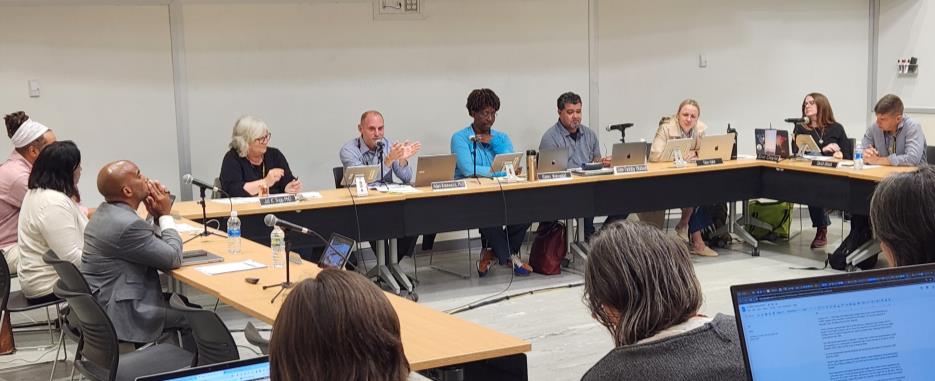
by Robert Lynch; June 14, 2024
A box full of “Vote Yes” buttons were scattered about the table at York Lecture Hall. Board of Education members were wise enough not to pin them on—state law, don’t you know. But others did. And many of the attendees who donned those buttons and crowded into the room also applauded speakers who spoke. It was Tuesday, June 11th and a Public Hearing into the proposed 2024-25 Ithaca City School District (ICSD) Budget, a budget that in recent weeks has gone on a diet.
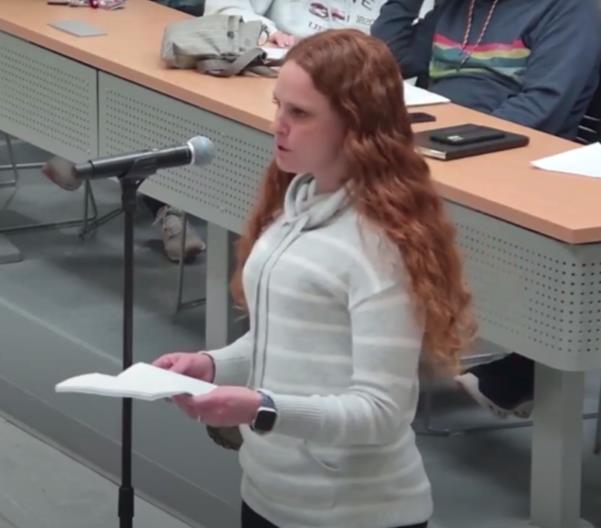
This new, now tax-cap compliant $163 Million spending plan will go before voters Tuesday, June 18th. A compact-car version of a revised budget in the Newfield School District will also face voter approval that day. Each district’s initial try at a budget failed the first time around back on May 21st. Since then, the Board of Education in each district has cut spending and trimmed tax levies. Ithaca’s reduction was far more drastic, given its size. Newfield’s Public Hearing was Monday, the tenth; Ithaca’s was the following night, Tuesday, the eleventh. This is Ithaca’s story.
“What kind of community do we want to be?” Belisa Gonzales asked the Ithaca School Board on hearing night. The newly-proposed package may be “a watered down version of that which I believe we needed,” she conceded. But its rejection, Gonzales predicted, will harm the “most vulnerable amongst us.”
Fifteen speakers ate up the first hour of the Board of Education’s five hour meeting Tuesday. It was the Public Hearing portion of the session, the portion set aside to review the revised budget. Of those who expressed a preference, nine spoke in favor of the new proposal; four remained firmly opposed.
At the last budget hearing—the one that considered the budget that failed—twenty people took to the mic. And all but one of them had promised to vote “No” when referendum day came. No doubt, each followed through on his or her promise. The initially-decided budget lost by a seven-to-one margin. Most blamed its loss on the 8.4 per cent tax levy increase it carried. With property reassessments tipping the scales against the Ithaca homeowner, that big of a bite in just one year became too big of a bite for taxpayers to swallow.
But the $5.9 Million in spending cuts the School Board has made since the initial budget’s defeat have slashed the tax levy increase to 2.92 per cent. Although some program-protecting parents and educators fear the latest cuts will handicap kids’ learning, the optics today look far better than they did a month ago. Moreover, what the program protectionists feared most on this more recent hearing night was the alternative; the doomsday scenario that would happen if this second budget also goes down.
Albany lawmakers give local educators only two bites of the fiscal apple each year. A second defeat in June would impose on Ithaca a mandatory “Contingency Budget.” It would hold the tax levy the same next year as it is now. But instead of $5.9 Million in reductions from the May budget, the knife would slice deeper, chopping away as much as $9 Million in spending. A Contingency Budget would put more students in each classroom and leave fewer teachers to teach them.
Heather Beasley is the parent of two kids at Cayuga Heights Elementary. She favors what’s now called the “Re-vote Budget,” the one that’ll be decided this month.
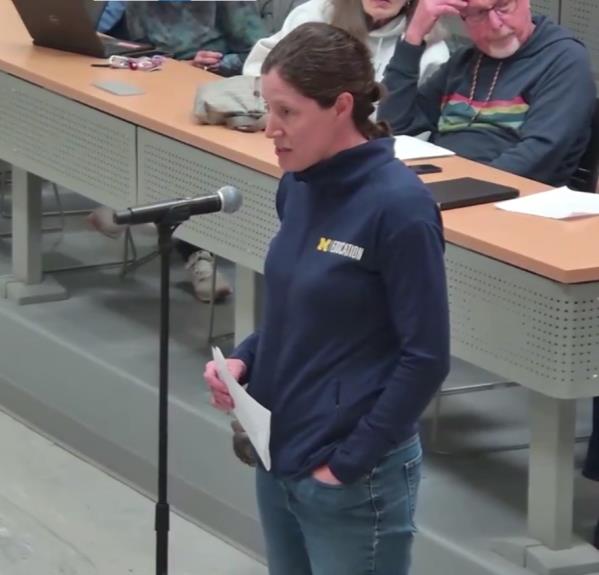
“Voters have made a statement,” Beasley stated. In May, she said, they rejected the first budget and tossed out two of the three incumbent Board members who sought reelection. That done, Beasley said, it’s our turn: “And now it’s time to make a statement in favor of our programs and our teachers and our communities.”
Steve Manley Zoomed in. He’s the parent of three and the treasurer of the Ithaca PTA Council.
“The public voted no on the previous budget and did so for a variety of reasons,” Manley stated. “The current budget may or may not respond to every one of (those) reasons,” he acknowledged. But a Contingency Budget, “will dramatically impact the ability of our schools to provide the extra programs and opportunities that make living in this district special.”
Rebecca Fisher joined those favoring the latest trimmed-down submission, rather than its alternative. A Contingency Budget, she said, would “increase class sizes, diminishing individual attention for students and adversely affecting academic performance.”
Not all speakers rallied to the new budget’s side. Leigh Rogers, who’d spoken against the Board’s earlier offering, spoke against this new one as well.
“I’m desperate not to leave my home,” Rogers, a beleaguered taxpayer from West Hill, lamented. “We’re not just a community of children,” she asserted. With those words, muted heckling could be heard from the gallery. Board President Sean Eversley Bradwell had to counsel civility.
“Others will suffer,” Rogers continued. “Single parents of school children will suffer. And grandparents, retired people on fixed incomes, will suffer,” she said.
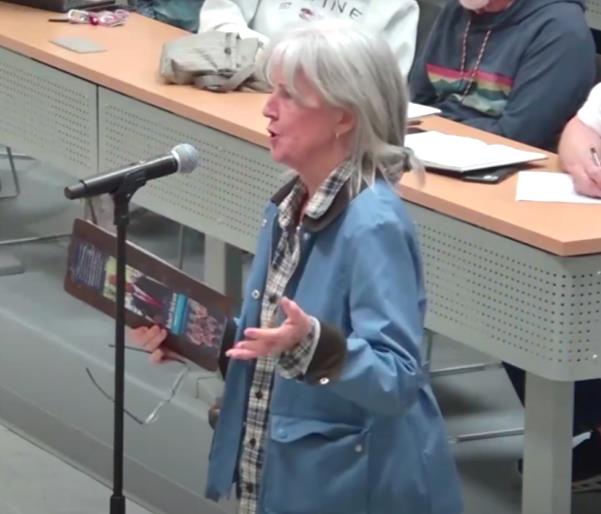
Rogers fears people like her are being priced out of Ithaca by its high school taxes. “If things don’t soon change in this company town,” she predicted, “it’s going to be a gated community perfectly fitted to suit our freeloading neighbors on the east side of the lake.” By that, she was thinking of Cornell University.
“There are no layoffs?” Jim Mann asked with amazement. He’d prefer some. He’d spoken against the earlier budget as well. “Our mission here is to educate students,” not to focus on extracurricular activities, he argued. “We need to run an austerity budget and focus on our core mission.”
The Ithaca District “cannot afford to be all things to all ideas,” Michael Hayes said as the hearing’s final speaker. The district “needs to develop a trajectory of cutting costs.” Hayes would return education to the “three R’s.” He’d also fire the School Superintendent, Dr. Luvelle Brown. Hayes urged the incoming Board of Education to do just that.
Customarily, Ithaca School Board members respond to public comment as soon as the comment period ends. Not this time. It was not until after a 40-minute executive session, one wedged between the hearing and the meeting’s regular business, that elected leaders chose to comment. Most hearing attendees had already left. Eldred Harris took his turn to speak. He spoke longest.
Eldred Harris, African-American, is the 15-year incumbent who finished dead-last in this year’s seven-way race for three seats on the Board of Education. He’s among the Board’s a staunchest defenders of robust spending to pay for better programs, especially for students who look very much like him.
In what may have become his swan-song as he exits elected office, Harris took passing swipes at many. Targets included teachers who decline to innovate; critics who fault schools for poor performance by using outdated data; and most particularly, those now obsessed with keeping taxes low at the cost of slighting students.
“Equity costs money,” Harris insisted. And equity, he argued, is something “that we are now threatening to completely wipe off of the table.”
Inequity within the Ithaca District, Harris observed, has been a decades-long problem, not something that’s brand new. “And to make yourself appear that you are now concerned about the issue is both duplicative and it disgusts me.”
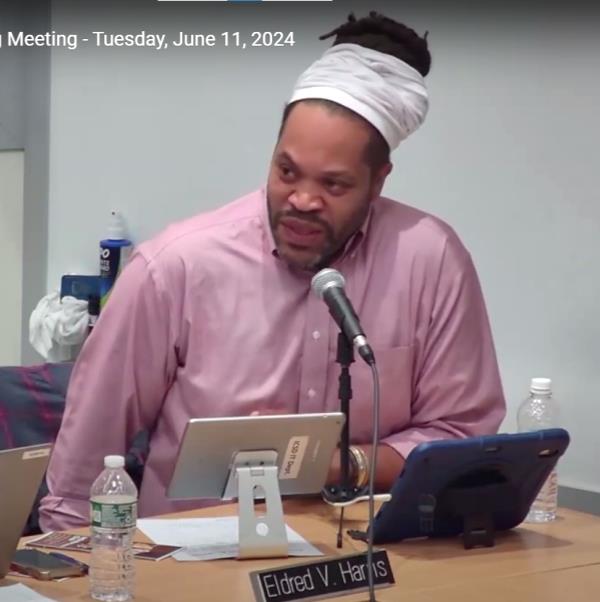
Eldred Harris took an all-too-transparent parting shot at one of the newly-elected people who’ll replace him, development executive Todd Fox.
“The folks who rabidly have gone after tax abatements in this community in a profiteering attempt to get in while the getting is hot, to stand at this microphone and debase children, you should be ashamed,” Harris emphasized.
For the record, Todd Fox, while he may have complained of high taxation and sought to add his managerial expertise to the school board’s skill set, has never, to this observer’s knowledge, “debased children.”
“The community, using democratic methods, made it clear that my voice is no longer needed, Harris concluded, acknowledging his defeat. “But I’m going to warn all of you that I’m going to be watching.”
And then, the sting of Eldred Harris’ defeat—and most particularly, defeat by a man he quite obviously does not respect—became its most evident.
“We built something here that was built for children,” Harris said. “And folks now with no knowledge are threatening to destroy it by infusing fear and illogic into the conversation.”
Whether hyperbolic or maybe all-too dead-on accurate, Eldred Harris will leave office at month’s end.
****
An issue that got almost no attention at the Ithaca budget hearing Tuesday was the bus proposition. Rejected in May, just like the budget, the proposition to buy new school buses and other vehicles will face Ithaca’s voters again June 18th. But just as with the budget, bus spending will now cost less. This time, voters will decide a $1.6 Million proposition to commit fiscal reserves to purchase two electric school buses, plus two more that run on propane. The spending and the number of purchases are exactly half of what voters were asked to approve, but rejected, last month.
As the meeting headed into its final, fifth hour, the Board of Education offered its first extended discussion of member Jill Tripp’s proposal—a long shot though it may be—to negotiate with Cornell University to increase from its current $650,000 to $10 Million Cornell’s payment to the District in lieu of taxes.
“How did you come up with the amount of 10 Million?” Board colleague Karen Yearwood asked.
“I made it up,” Tripp candidly replied. She then elaborated. To Tripp the amount is only about a quarter of what some argue Cornell deserves to pay.
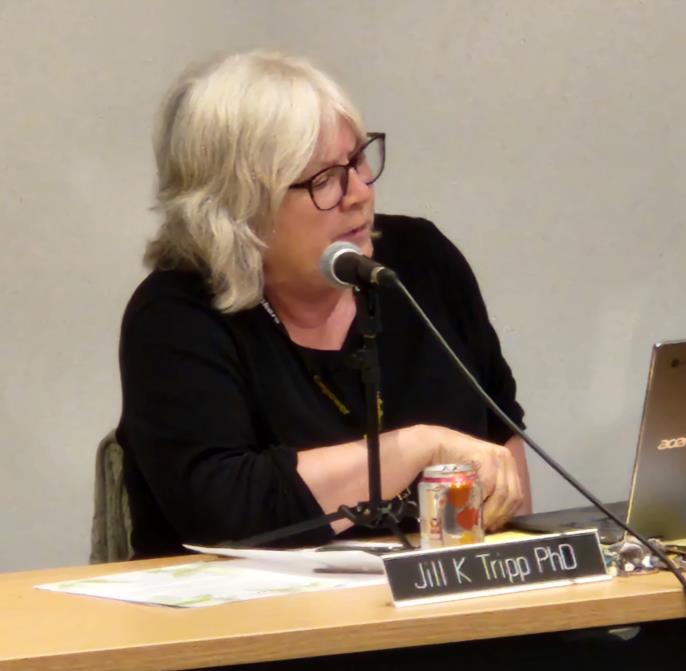
When it comes to Jill Tripp’s appeal to Old Ezra, some might say “Good Luck.” And Tripp foresees no easy task in the uphill climb ahead. It may be as challenging as trudging up Libe Slope in a snowstorm.
“This is a huge undertaking,” Tripp said of the prospective negotiations. “And I don’t think for a moment that the School Board is able to take that on.”
Or maybe, District Administration, either. While Dr. Tripp had proposed Superintendent Brown be tasked to haggle with Cornell, School Board consensus that night favored tossing the task to an advisory committee, one comprised of district officials and community representatives.
“I would not like to see our Superintendent go out there alone on this,” Eldred Harris told those at his head table. “To go in not necessarily blind, but with a hand out saying ‘pay what you owe,’ would not lead to the successful result we want,” Harris concluded.
Jill Tripp claims other Ivy League universities pay seven or eight figures to their own hometown school districts. Princeton, she said, pays $4.8 Million; Brown University, $1.3 Million; the University of Pennsylvania, $10 Million.
Board President Sean Eversley Bradwell raised a complication: Cornell is a hybrid; a public-private university. Might the school district find itself negotiating, at least in part, with the State of New York?
The Board of Education may decide how to proceed with Jill Trip’s initiative at its final meeting of the school year, June 25. By that time, they’ll know whether they’ll need to go the Contingency Budget route.
###
ICSD’s Brown likely to exit in ‘28
by Robert Lynch, June 6, 2024
Though it remained unpublicized as of midday Thursday, Dr. Luvelle Brown, the Ithaca City School District’s sometimes-controversial Superintendent of Schools, will likely step down from that position when his current contract with the District expires in 2028—if not before.
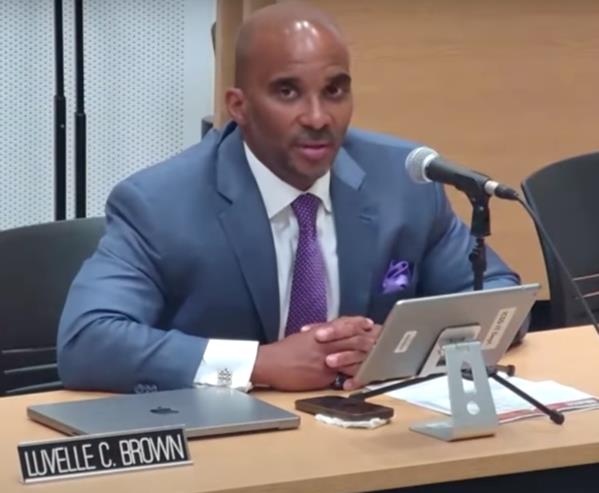
Dr. Brown “is not seeking an extension or amendment to his current contract,” a District official stated to online publication 14850 Today on Tuesday, June 4th after its reporter inquired about an “HR [Human Resources] Work Session” the Board of Education had planned for later that afternoon.
”He has committed to serve through June 30, 2028,” the publication further reported the spokesperson as saying regarding Dr. Brown.
The story, though a genuine scoop, has received little or no mention elsewhere since it was posted.
The H.R. Committee’s work session was to be devoted entirely to an executive session. The online publication implied Dr. Brown’s continuing status was to be discussed in that private committee meeting.
As of late Thursday morning, no news release or other notification could be found on the Ithaca City School District’s complex, multi-layered website concerning Dr. Brown’s status.
Asked to confirm the report, Tricia Beresford, Clerk of the Ithaca Board of Education, Thursday morning said this statement of fact: “Dr. Brown’s current contract is valid through June 30, 2028.” Beresford directed further inquiries to the ICSD’s Communications Office.
Dr. Brown’s contract calls for the Ithaca Board of Education to provide the Superintendent annual extensions of that contract four years in advance of its termination. The Board customarily votes on such extensions during June.

Following its Monday, June 3rd special meeting where it quickly discussed and approved the $163 Million revised 2024-25 Budget to be submitted voters for a re-vote later this month, the School Board recessed for an executive session, the latest of several in recent weeks. The Monday closed session’s purpose was stated for “discussing the employment history of a particular individual,” a boilerplate phrase used to comply with the state’s Open Meetings Law.
“The work of the Board is done for the evening,” Board President Dr. Sean Eversley Bradwell stated as he closed the open meeting. “We have no clue how long we’ll be in executive session,” he said. “But there will be no additional votes for the evening, as I understand them.”
A post-meeting video confirms that absence of any further public action.
In the recent Ithaca School Board election, most candidates stood uncommitted as to whether they’d support further extending Dr. Brown’s contract. However, one successful candidate, Todd Fox, stated publicly that he would not support an extension.
At several recent meetings, Superintendent Brown has assertively defended his tenure and performance during his years of service, despite recent New York State Education Department reports that found several schools, including Enfield Elementary, and most recently Boynton and Dewitt middle schools, deficient in their student performance. The middle schools’ performance deficiency among African American students was cited in particular.
Any efforts to end Luvelle Brown’s contract prior to its June 2028 scheduled termination have not been discussed publicly by Board members during open meetings.
In January 2021, Dr. Brown had announced his planned resignation to accept a corporate position. But he later rescinded that resignation, and the Board of Education at the time allowed the Superintendent to continue. Annual contract extensions have followed.
###
Next Administrator’s pay close to 200k
Tompkins Legislators approve raise; nix tax cap override
by Robert Lynch; June 5, 2024
Just like fixing your car or cutting your hair, the price of running your county’s government has fallen victim to inflation.
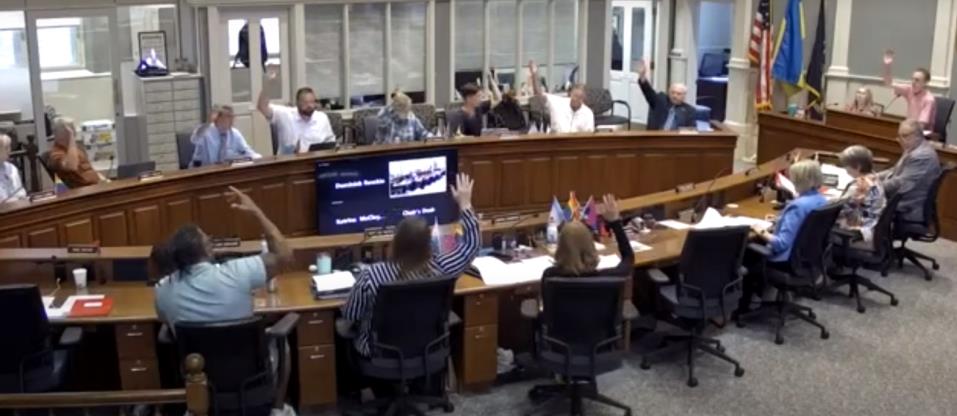
By unanimous votes during each of two meetings Tuesday, Tompkins County lawmakers approved a new, higher salary for whomever it hires to succeed Lisa Holmes as Tompkins County Administrator after Holmes retires at the end of this year. The new Administrator’s annual pay will approach $200,000.
In the same meeting at which members ratified a committee’s earlier-recommended salary increase, the full Legislature balked at approving a usually-routine local law that would permit next year’s county budget to increase its tax levy above the otherwise unenforceable “Tax Cap” that Albany accountants annually set.
The Legislature’s failure to muster the needed supermajority to allow the cap’s override provided the latest confirmation that the political class is listening to taxpayer unrest, discontent most vividly expressed by Ithaca City School District voters’ rejection in May of their next year’s budget by an uncharacteristically hostile seven-to-three margin.
As to the Administrator’s pay, County Commissioner of Human Resources Ruby Pulliam recommended to the Legislature’s Budget, Capital, and Personnel Committee Tuesday afternoon that the Administrator’s starting salary be raised to a high-end limit of $180,000. “It would give us a competitive edge,” Pulliam said. “It would also allow us to put our best foot forward and hopefully save some time (in finding a successful candidate).”
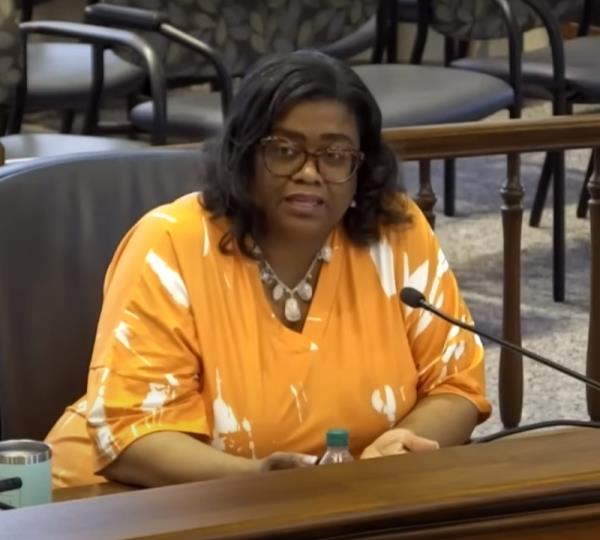
When Lisa Holmes was elevated from Deputy Administrator to County Administrator in March 2022, Tompkins County “red-lined” the position’s pay upwards to $160,000. The action placed the salary higher than its otherwise-specified salary grade would have provided.
And the further increase recommended in committee Tuesday was higher than had first been planned. A printed Resolution before the Budget Committee would have risen the new hire’s starting pay to between $165,000 and $175,000. Committee members bumped the high-end number up an additional $5,000 at Pulliam’s request.
Several hours later, when the committee’s recommendation came to the floor of the full Legislature, the revised measure passed with little discussion.
Pulliam advised the committee that pay for successful new employees generally rises by five per cent after nine months in the job. For Holmes’ successor, that would increase the position’s “work rate” pay to $189,000 annually.
In addition to the higher starting salary, the Legislature Tuesday provided up to $10,000 as a relocation bonus for the new Administrator. At H.R. Commissioner Pulliam’s request, the committee doubled its relocation allowance from an earlier-proposed $5,000.
“Realistically, that is an astronomically low number,” Pulliam said of the $5,000 relocation package first proposed.
Pressed later by the committee, the H.R. Commissioner explained that the $10,000 in moving reimbursements would exist as a ceiling, not an assurance. Expenses would need to be documented, and temporary housing costs would not count toward reimbursement.
“I would hate to advertise a lower salary,” Pulliam told the committee, “and waste a month or two with people who are not getting applications, then starting over to increase the salary.”

Indeed, those false starts have proven true in the recent past. After Jason Molino resigned as County Administrator in 2021, the Legislature first bumped up the Administrator’s salary to $160,000 and launched a nationwide search. But it came up dry on its first attempt. The search then began its second-round. That’s when Holmes applied and secured the promotion.
With Lisa Holmes having announced her retirement plans this past April, Tompkins County will again, as it did after Molino left, search nationwide for her successor. That’s despite a national search’s limited success in the past. This time, the firm Goodwin Recruiting will seek out candidates. Goodwin will receive $55,000 for its effort; a fee computed at one-quarter of the first year’s starting salary plus the newly-raised relocation bonus. Pulliam said the rate is standard for executive head-hunting firms.
When the committee’s recommendation reached the full Legislature, the only question came from Newfield’s Randy Brown, who asked why the head-hunter’s commission was as high as it was. (Legislators Mike Sigler and Deborah Dawson were excused at the time of the Legislature’s subsequent, otherwise-unanimous vote.)
“I’m probably a minority here, but I think this is a little too rich for my blood,” Budget Chair Mike Lane said earlier in committee that afternoon. Lane noted that a few years ago, under Molino, the Administrator’s pay was only around $140,000. Then it went to $160,000 under Holmes; and now up to nearly $190,000 next year, nine months after the new hire would take office.
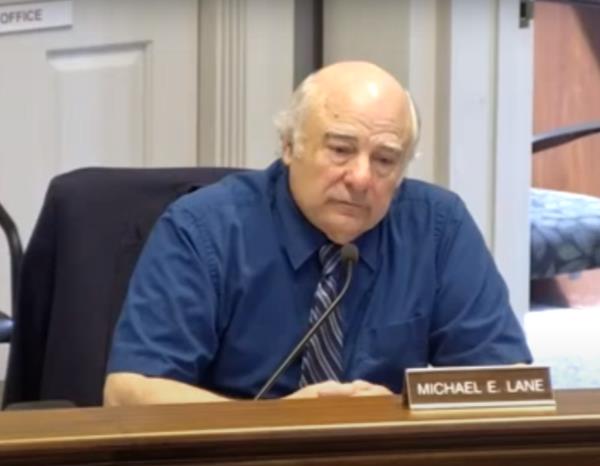
“I think that’s a pretty fast increase for the County Administrator,” Lane observed. Nevertheless, the chairman joined in the committee’s—and later the full Legislature’s—unanimous votes.
Committee member Rich John was similarly reticent, but endorsed the recommendation after careful thought.
“I’m looking at our budget where we came in just under a quarter-billion dollars,” John reminded himself. “We are a big operation.” With “the responsibility entailed in that,” he reasoned, “I can live with the 180; actually 189.”
Groton’s Lee Shurtleff recalled that perhaps 25 years ago, Tompkins County was paying its Administrator only $100,000. With three percent annual increases compounded over those decades, Shurtleff said, what’s being recommended now probably hasn’t kept up with inflation.
“We need the flexibility in order to recruit from the widest pool,” Shurtleff said in support of the salary the committee set.
****
During Tuesday’s committee discussion of administrative pay, Mike Lane took note of the newly-erupting taxpayer revolts. “We’re seeing feedback at school districts,” Lane said, plainly referencing budget rejections in both Ithaca and Newfield over perceived runaway school spending. So it became ironic that later in the day, Lane proved the most ardent defender of the proposed Tompkins County local law that would override New York State’s so-called “two per cent tax cap” within the County’s own next year’s budget.
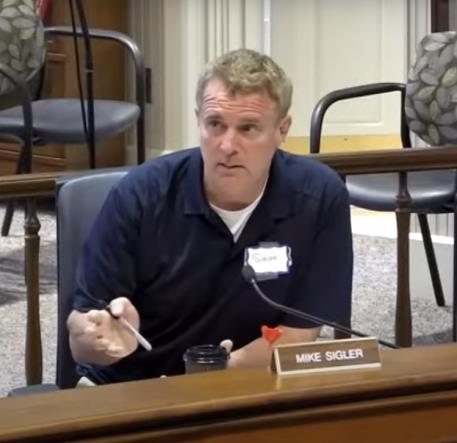
The tax cap override has been a routine ritual of government. The override law has been adopted most every year, yet seldom invoked. It’s been used only once. State law requires a supermajority of nine legislators for the local law to pass. Tuesday, it fell one vote short. All of its supporters were Democrats.
“I vote against this every year,” Republican legislator Mike Sigler—also a candidate for State Senate— stated proudly. “And I would like to note that the public is 100 per cent against this.”
“I think it does send a signal that we are open to kind of raising taxes,” Sigler warned of the override. He said it’s a vote that can be taken later, not now, and done so when the Legislature gets closer to adopting its budget this fall and finds the higher levy necessary.
At a “budget retreat” in late-April, legislators directed Administrator Holmes to keep next year’s tax levy increase no higher than this year’s levy rise of two per cent. Holmes said that such a limit would force spending cuts, as maintaining current service levels would push the levy up by 5.9 per cent.
“I think the message is out there that we are going to keep our tax rate as low as possible and keep our levy as low as possible, and I want to continue with that message,” Sigler stated.
Before votes were recorded, Sigler left to attend his daughter’s high school music concert. And while no one expects Sigler would change his mind were Tuesday’s rejection ever to be reconsidered, another absent member’s vote could be in play. Deborah Dawson was also away that meeting night. It’s believed she’d support the tax override. And she could raise the issue again, providing she attends the Legislature’s next meeting June 18th and seeks reconsideration then.
For what it’s worth, Mike Lane complained after the vote that had he known how close Tuesday’s vote would be, he’d have changed his position before the final tally so that he could have sought reconsideration later.
I don’t think this is the year to be dramatically raising taxes,” Greg Mezey, one of only two Democrats to oppose the override, told the Legislature. “It seems kind of unnecessary to me.”
Mezey stated that in his opinion, Tompkins County can weather “whatever storm may come our way.” And he also acknowledged that some believe Tompkins County has “in excess of $30 Million” of savings—previous tax collections—in its own fund balance.
“I see no reason to pass this tonight,” Mezey said.
Among those legislators representing Enfield, Anne Koreman voted in favor of the override; Randy Brown opposed it.
###
Breaking: Ithaca BOE sends Tax Cap Budget to voters
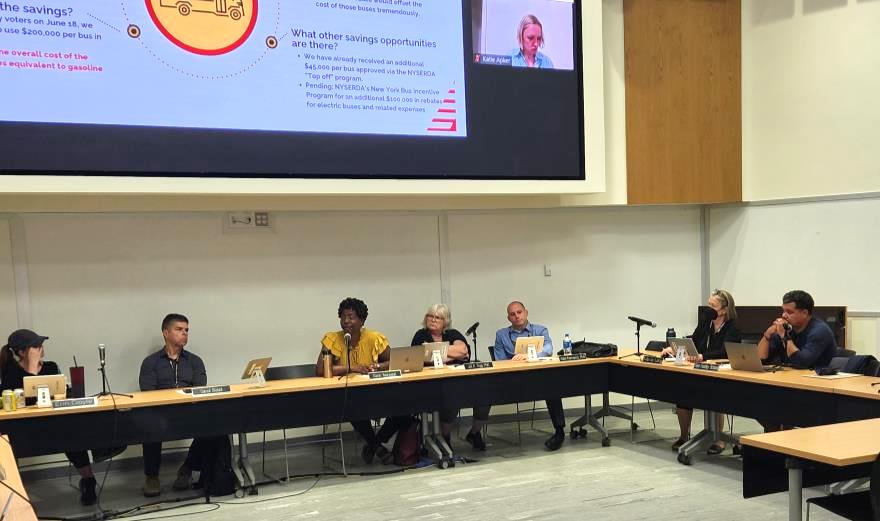
by Robert Lynch; June 3, 2024
Whether by happenstance or by intent, the visor on Erin Croyle’s cap blocked us from seeing the emotion in her eyes Monday night. But it could not hide her words. “We need to make it very clear,” the Ithaca School Board member said, that if we are forced to accept a Contingency Budget, “our schools would be a shell of themselves.”
At past meetings, Croyle, the mother of a disabled Ithaca student and the Board’s leading advocate for spending what it takes to ensure quality instruction, has nearly cried when critics faulted the district’s budget as being bloated, and when Board colleagues agonized over where and how to cut, and cut… and cut even more, just to find a level of school spending and taxation that voters will approve this second time around.
Nonetheless, Monday night, Erin Croyle joined her six colleagues at the meeting table and a seventh on Zoom to endorse and send to Ithaca’s voters June 18th a trimmed-down $163 Million next year’s budget, one that would set projected spending low enough so that its tax levy increase would fall under New York State’s tax cap.
And because the budget would be tax cap-compliant, the resubmitted proposal would require only a simple majority of support to pass, not the 60 per cent super-majority of the electorate that the earlier-rejected $168 Million spending plan would have needed, yet never got.
It would have been a surprise had the Board Monday endorsed anything except the Tax Cap Budget (otherwise known as the “Re-vote Budget.”) For more than three hours on Tuesday, May 28th, the Ithaca Board of Education had agonized over the budget its voters had rejected. Its members had increasingly coalesced around revisions that would contain the tax levy within the cap and shrink the earlier budget’s 8.4 per cent levy increase, rejected May 21st, to a mere 2.92 per cent.
The $168.9 Million proposal put to Ithaca’s voters in May lost in a landslide, with more than seven out of ten opposing it. State law permits a school board to resubmit a failed budget only once, whether modified or not. Recognizing the margin of loss, no one on the Board of Education during its post-mortem meetings has given serious consideration to submitting the exact same budget a second time. Rather, the issue has been how deeply to cut spending, while at the same time bracing for the stark consequences of a second potential defeat.
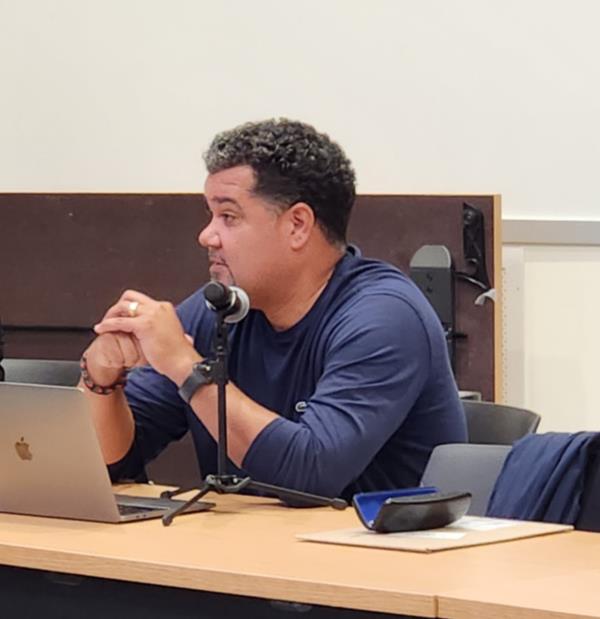
Should a revote fail, state law would mandate a “Contingency Budget” for next year. It would lock-in the next year’s tax levy at the current year’s level. It would also usher in a host of draconian austerities that scare parent-educators like Erin Croyle. Class sizes would invariably increase. Equipment could not be bought. Buildings could be used only for instructional programming, thereby severely curtailing their after-school use. And extracurricular activities like fine and performing arts could see major cuts.
“There would be nothing after-school except sports,” Croyle warned. “And extracurriculars would be reduced. I mean, that’s a terrifying prospect,” she said.
No member of the Ithaca Board of Education had the stomach Monday for adopting a Contingency Budget for the year ahead. But such an austere option remained the only alternative on the table to the tax cap-tied plan the Board ultimately embraced. A more costly compromise, one that would have hiked spending by 4.1 per cent, an increase in line with the Consumer Price Index, had already been unceremoniously scratched from consideration at the meeting one week earlier.
“This is the community’s opportunity to tell us what they think,” Jill Tripp, the Ithaca Board of Education’s most fervent advocate of fiscal frugality, told Board colleagues Monday. And Tripp gave the tax-cap limiting “Re-vote Budget” her stamp of approval.
“It’s not a perfect budget,” Tripp acknowledged. “It doesn’t have everything that I wanted. And it has some things I didn’t want. But I believe we’ve come pretty much to consensus on this, and I will support this budget.”
“I think we’re headed in the right direction, and I expect that we’ll continue in the direction that we started on,” Jill Tripp observed. “So I’ll be voting yes. I hope you’ll join me,” she said.
Board president Dr. Sean Eversley Bradwell came to a similar conclusion.
“It’s not the budget that I want, but the budget I can support,” Eversley Bradwell said, the Board President echoing his almost identical assessment of the budget compromise made nearly a week earlier.
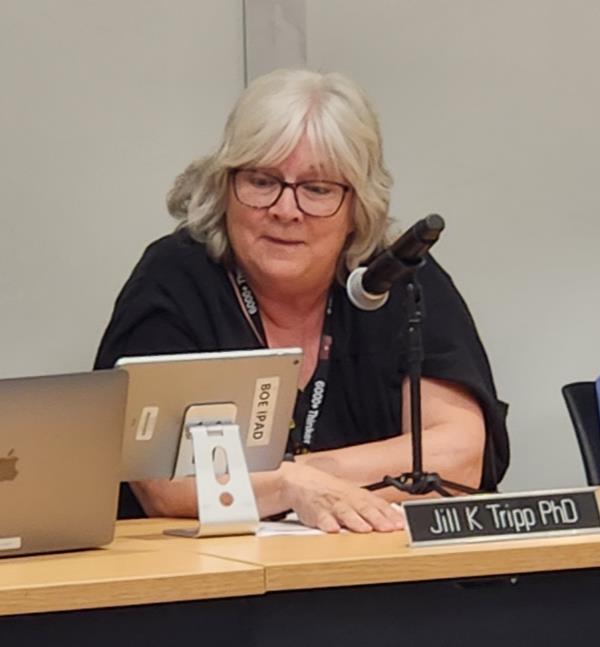
Whereas the Ithaca Board of Education strained over budget numbers at its previous meeting, Monday’s decisions came quickly. It completed its public session in only about three-quarters of an hour. Seven of the Board’s nine members attended in the High School’s York Lecture Hall. Katie Apker Zoomed into the meeting. For reasons never explained, Eldred Harris—like Croyle, a staunch backer of costlier alternatives—joined the meeting only after the Board had taken its key budget votes.
As was discussed in greater detail May 28th, the Re-vote Budget endorsed Monday would eliminate an estimated 22 teaching positions within the Ithaca City School District (ICSD). When compared with the higher budget that voters rejected in May, a full 39 teaching positions would be cut.
Deputy School Superintendent Lily Talcott told the Board that based on a five-year average, about 58 teachers retire or resign the school system annually. Therefore, administrators believe the proposed teaching reductions can be accomplished through attrition.
But should a Contingency Budget become the voter-dictated default alternative, administrators have not forecast publicly how deeply instructional staff might be cut.
Yet perhaps the financial numbers give an idea. The “Re-vote” compromise, embraced by the School Board Monday, would force $5.9 Million less in spending compared to May’s voter-rejected budget. A Contingency Budget would cut $9 Million from the May submission’s spending total.
A Contingency Budget would spend $159,864,221, just a fraction of a per cent above this year’s spending level. That budget’s tax levy would remain at this year’s $107,714,290. The $163 Million Re-vote budget would set its tax levy a bit higher, at $110,862,167.
District Chief Operating Officer Amanda Verba brought one unplanned surprise to the Board of Education’s meeting Monday. After the district had earlier this year been denied a hoped-for grant to subsidize the purchase of electric school buses, Verba informed the Board that the U.S. Environmental Protection Agency has just awarded the ICSD $800,000 in rebates to purchase electric vehicles.
The district can use $200,000 of the rebate money to reduce the price of each electric school bus it buys. Not yet knowing of the award, the Board last week trimmed from four to just two the number of electric buses it will ask voters to purchase in the June 18th revote.
An eight-bus purchase, including the four electric vehicles, had been rejected by voters in May along with the budget.
The rebate money, Verba informed the Board, puts an electric bus’s price equivalent to that of a gasoline bus. Nonetheless, the Board cannot retract or revisit last week’s action. So half of the rebate money will have to wait its turn and be applied to the two remaining vehicles next year.
“The reality of the timing of it,” the administrator said, forces the delay.
###
Newfield BOE cuts “shop” to spare budget
Further, deeper cuts averted for now
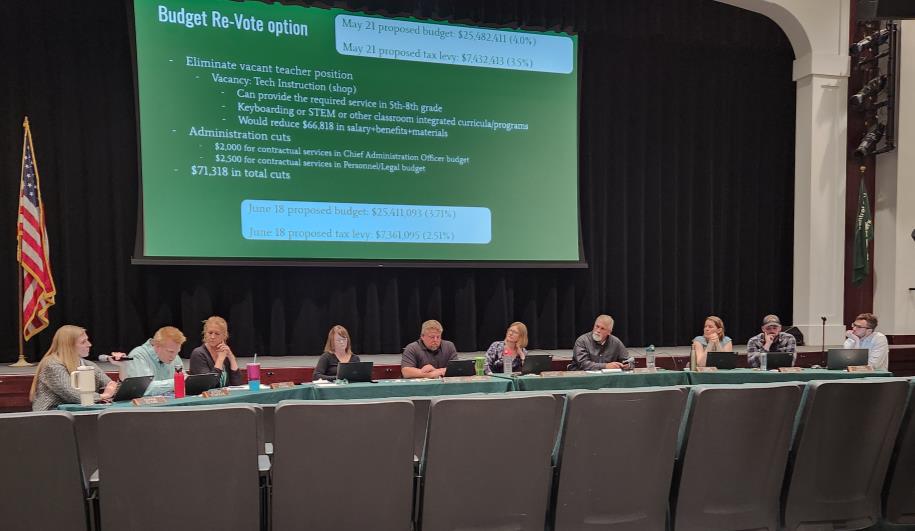
by Robert Lynch; May 31, 2024
The Newfield Board of Education took a scalpel, not a meat axe to its once-failed school budget Thursday night. And when its nearly two-hour surgery had ended, the Board handed voters a pared-down spending plan that would raise next year’s tax levy 28 per cent less than would have the budget voters rejected May 21st by a mere 18 votes.
Spending in the $25,411,093 revised budget that the Newfield Board unanimously adopted Thursday stands only a fraction of a per cent (or $71,318) below that of the budget rejected in May. Yet it would increase the Newfield tax levy’s increase by only 2.5 per cent next year over that for the current year. The plan voters turned down last month would have hiked the levy by 3.5 per cent.
How Newfield administrators and the Board accomplished that reduction quelled much of the anxiety that was expressed through comments at a meeting only one week earlier. Sports programs need not be cut. Nor would music programs like high school band be eliminated. Elementary classroom sizes would not necessarily increase.
What would be impacted is a single upper-class-class program; today referred to as “Technology Instruction.” The old-fashioned term was “shop.” Though Newfield prides itself with having a large industrial arts area full of modern equipment, the shop will have no teacher next year. But then, again, it hasn’t had one for a while.
“It has been very difficult to fill,” School Superintendent Eric Hartz told Board members Thursday concerning his efforts to hire a teacher in technology instruction. Hartz said shop class hasn’t had a permanent instructor for the past three years.
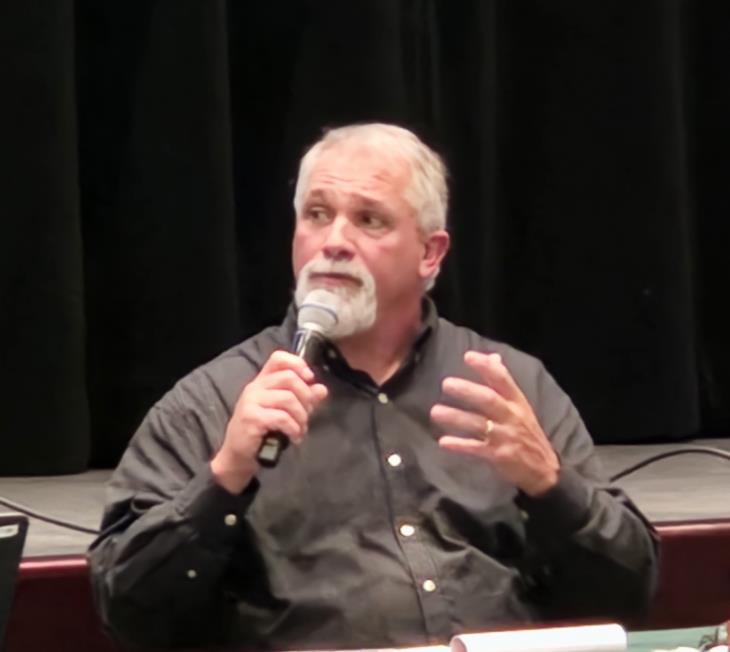
So from a personnel standpoint, eliminating the shop teacher is painless. On the books, the job’s reduction saves the budget nearly $67,000 in salary and benefits.
Board members raised hypothetically some other more draconian cost-cutting measures during Thursday’s nearly two-hour discussion. But none of them gained traction. At least they won’t until after Newfield’s electorate renders its verdict in the June 18th budget re-vote.
The first-submitted 2024-25 Newfield Schools’ Budget was rejected last month by a relatively narrow margin; 248 votes (48.2%) supportive to 266 votes (51.8%) opposed. The margin of defeat pales by comparison to that in the district’s northeastern neighbor, the much-larger Ithaca City School District. On that same day in May, the Ithaca budget went down in flames with more than 70 per cent of voters opposing it.
And other differences stand between the two districts: Some are quantitative; others are qualitative and more difficult to grasp, unless one (like this writer) had heard the public comments and sensed the body language at post-mortem meetings conducted following this year’s budget defeats in both districts.
At $168.9 Million, the Ithaca City School District’s rejected budget was nearly seven times as large as Newfield’s. So cutting expenses by eliminating a position or two here and there doesn’t hold the same leverage in Ithaca as it does in Newfield.
Moreover, Ithaca’s tax hike began at a much-higher starting place. Ithaca’s rejected school budget had called for an 8.4 per cent annual rise in the tax levy. (It had earlier been proposed as high as 12 per cent.) Newfield’s increase was a mere 3.5 per cent. So closing a gap through minor cuts in Newfield proves far easier.
But there’s something else. While public complaints about the initial budgets have arisen in both districts, objections registered in Newfield during two recent meetings have seemed more muted, more nuanced, and to an extent, more balanced.
At Board sessions in Ithaca the afternoon following its failed budget referendum and again May 28th, not one resident stood up to defend its district’s rejected budget. It was different in Newfield. At the Newfield District’s two comparable meetings, budget critics and supporters held nearly equal sway.
“Programs here are amazing,” one Newfield parent told her school board Thursday. “It’s not perfect,” she acknowledged. “But we can’t get these without spending the money.”
Indeed, of the eleven people who addressed the Newfield Board of Education prior to its Thursday deliberations, nearly as many referenced the problem of school bullying as focused on the budget.
Indeed, when it came to district finances, one of the more frequent Newfield comments—even among some members of the Board—involved an earlier initiative to acquire an electric school bus with its up-front expenditure of about a half-million dollars. Its cost was to be partially abated through grant money.
The bus measure lost in the May referendum by a sizeable margin (218 votes to 299). Neither at last week’s nor at this week’s meetings did the School Board attempt to resubmit the bus purchase for a vote.
Should Newfield’s electorate reject the Board’s latest attempt to secure budget passage, state law requires the Board to impose a “Contingency Budget.” Such a budget would freeze the tax levy at this year’s level and impose program cuts to keep spending in line with the district’s ability to pay its bills.
“If the 2.5 (percent levy increase) doesn’t pass, you need to think what contingency looks like,” Superintendent Hartz warned. “Dollar for dollar, it doesn’t look like much,” Hartz stated, “But we lose a lot.”

While a contingency budget would lower the tax increase from 2.5 per cent to zero, the personnel and program cuts such a budget might dictate could prove far more painful than the ones engineered Thursday. Scenarios given greater consideration during the Board’s last meeting, May 23rd included the potential elimination of some or all sports programs, curtailing instrumental music instruction, and/or leaving multiple vacant teaching positions unfilled at the elementary or middle school levels.
But right now there’s no talk of layoffs.
“We’re not cutting anybody,” Hartz advised the Board concerning the technology instructional position. “We’re looking at someone we can attrition down.”
Although the full-time shop instructor job has remained vacant for years, someone has been teaching a class or two there recently. But that instructor is dual-certified in Special Education, and the Superintendent plans to reassign the teacher to Special Ed.
And although New York State mandates a certain amount of technology education, District officials plan some work-arounds. State rules are quite lenient in that area, School Board President Christina Ward stated after the meeting. Ward said math instructors may help fulfill the mandate. Keyboarding or what were termed “other classroom integrated curricula/programs” could be employed.
But the technology shop will remain in place.
“I don’t want to get rid of any equipment in that room,” the Superintendent said, suggesting it may be utilized in some way in the future. “It’s a very large room,” Hartz said of the tech instructional area. “There’s a lot of things you can do with that area to do something down the line.”
To close the budget gap, in addition to the shop teacher’s elimination, Newfield’s budget planners Thursday shaved $4,500 in administrative expenses, exacting minor cuts under the categories of Chief Administration, personnel administration, and the legal budget.
A bigger budget cut was broached by the Board at one point, but not carried forward, at least not yet.
“What else is there on our budget we can look at?” Board member Jeremy Tenwolde asked late in the discussion. “I’m throwing out a straw man,” he said, “Do we need three building principals?”
Currently, Newfield employs principals at the elementary, middle, and high school levels. Board President Ward later explained that the district had all three positions filled prior to COVID. It merged middle and high school administration during the pandemic, but then restored three-person supervision thereafter.
But with budgets now tight, the three-principal issue returns for reconsideration.
Talk of an administrative cutback drew Board member Shana Claar into the discussion. Claar, who passionately defended Newfield’s program at last week’s meeting, drew from that emotional well once more.
“I don’t know how we could have less supervision,” Claar reasoned, the Board member taking note of the parent-expressed public comments about in-school bullying. “I have seen a lot of improvement when it comes to taking children’s emotional well-being into account.”
“Having a principal in all three schools wouldn’t be an issue if we didn’t have behavioral issues,” Claar told colleagues. “How do we show concern for the emotional and mental health of students when there’s less oversight?”
Shana Claar will depart the Newfield School Board next month.
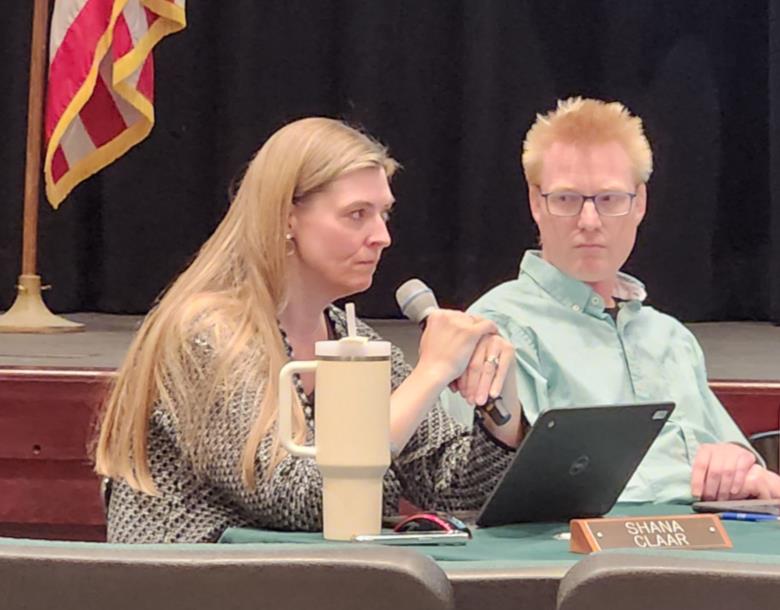
Tenwolde backed away from his straw man suggestion about administrators and changed the subject. “I do hear from teachers. In my mind, a happy teacher is a better teacher.”
Board Vice-President Timothy Payne advanced another possibility. He questioned about possible reductions among non-teaching staff.
Superintendent Hartz shot down that idea. Hartz said positions like cleaning staff are already drawn thin.
To make the proposed tax levy increase in the revised budget equal an even 2.5 per cent, the Board at the last moment withdrew $493 from its fund balance. That reduction will not hurt. Yet, still, Newfield’s financial cushion—its fund balance—has limits.
“We totally have less than a million dollars to our name right now,” Hartz cautioned, referencing a fund balance that barely climbs into the seventh digit.
And while he was talking frugality and thrift, Hartz countered those who might criticize his own pay check.
“People think I’m making a Billion dollars. I’m not,” the Superintendent said. He rattled off his annual pay these last four years. A document posted on the District website lists Hart’s salary for 2024-25 at $157,480, plus $52,262 in benefits.
Revised personnel numbers that administrators shared at Thursday’s meeting revealed they anticipate at least nine vacancies at the close of this school year. Four of those positions would be at the middle school, now two in the music department, two in special education, and one at the high school. With the technology position presumably one of the nine, Thursday’s Board action means the remaining eight openings can be filled, presuming applicants are found—and of course, barring any further austerity a contingency budget might later demand.
Meeting one week earlier, the Superintendent had forewarned that leaving vacant positions open could raise class sizes at the lower grades, increasing 15-17 student classrooms to 20 students or more.
As she left Thursday’s public meeting to enter an executive session, Board President Christina Ward credited the avoidance of those classroom increases as among the evening’s better accomplishments.
Newfield voters ballot on their revised budget June 18th. A Public Hearing on it is set for Monday, June 10th.
###
Recast ICSD Budget to hover levy below tax cap
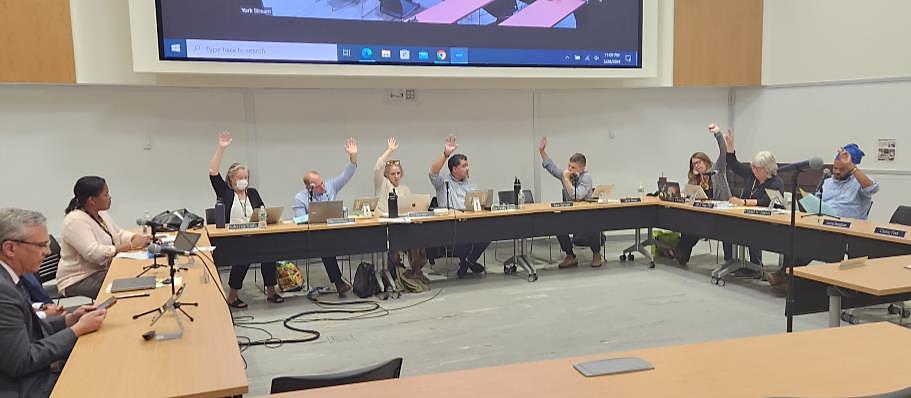
by Robert Lynch; May 29, 2024; expanded reporting now posted
While it left details to be resolved later, the Ithaca Board of Education late Tuesday strongly signaled that a revised Ithaca City School District Budget (ICSD), to be submitted voters June 18th, will carry a tax levy increase no higher than the New York State tax cap, an increase well under that of the initial nearly $169 Million budget Ithaca voters resoundingly rejected one week earlier.
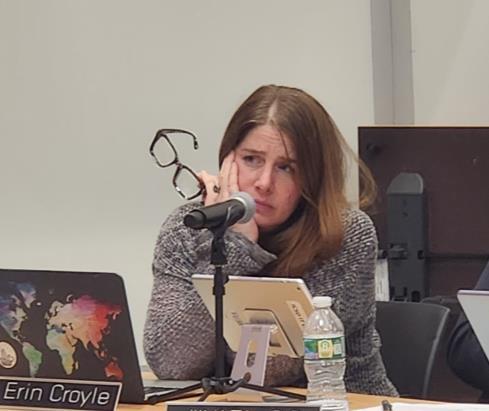
Near the end of a more than three-and-a-half hour public session, the Board (with one member excused) voted unanimously to put before the electorate next month the trimmed-down budget, together with a modified bus purchase option, one only half as costly as the package that was also voted down in last week’s referendum.
“It meets what I was looking for, and it meets my understanding of what many of our public correspondents (community members) have been looking for,” School Board member Jill Tripp, this year’s chief ICSD budget hawk, said as her colleagues coalesced around a $163 Million revised spending plan, one that would hike the tax levy only 2.92 per cent. Its spending would rise 2.79 per cent over the year.
“So I’ll just say, to be brief, that I would support the revote option under the tax cap,” Tripp told colleagues.
Tripp’s endorsement, if carried forward to a final School Board show of hands next week, could prove critical. Many Ithaca School District voters respect Jill Tripp’s fiscal frugality. They listen to her words. And Dr. Tripp’s support could drag many more votes the revised budget’s way.
By contrast to the “tax cap option” given the most serious consideration Tuesday, the proposed budget Ithaca’s voters rejected at the polls May 21st would have raised the tax levy 8.4 per cent. And an initial proposal offered by administrators earlier would have boosted the levy by more than 12 per cent.
Some Board members—most notably Eldred Harris and Erin Croyle—grumbled about the cuts necessary to make the new budget work. The “Revote Budget” as it’s being called, would cut an estimated 22 teaching positions from those at present, or 39 teachers from what the rejected budget would have supported. Administrators predicted all cuts would be absorbed through attrition.
One top-level administrator would also be eliminated, the position’s identity not specified.
The Board will reconvene in a week—probably Monday, June 3rd— to finalize the revised budget’s details. Members Tuesday resisted their only likely alternative, a so-called “Contingency Budget.” It would have cut spending still deeper.
Two Board members—Adam Krantweiss and Garrick Blalock—opposed resubmitting the bus purchase measure in any form, Blalock fearing its mere presence on the ballot could sink both propositions and force the ICSD into state-mandated austerity.
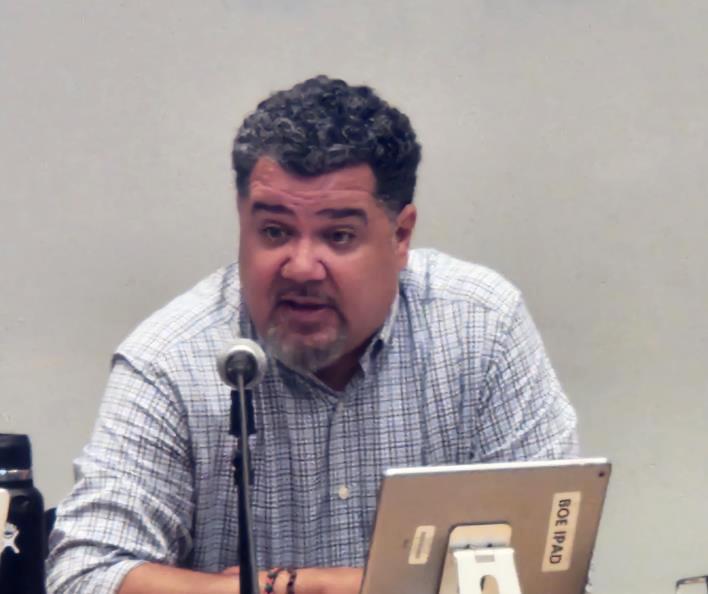
As they haggled over details during the final hour of their meeting—as 11 PM came and went—the revised transportation proposition would now buy only half as many buses as previously proposed. Instead of four electric buses, the District would purchase two; and instead of four “ultra-low emission propane buses,” it would buy just two. The proposition would tap only $1.6 Million from a capital reserve fund, not the$3.2 Million that voters had rejected May 21st.
And although it would normally have gained top-billing at any other meeting, the Board also welcomed a late-filed Resolution submitted by Board member Jill Tripp that would direct the Superintendent to negotiate a “memorandum of agreement” with Cornell University to pay $10 Million to the ICSD annually in lieu of taxes.
In accordance with its procedure, the Board, as its final order of business, accepted Tripp’s proposal, but laid it on the table for action at a future meeting.
Tripp, a frequent advocate of increased Cornell support of the School District, stated in the Resolution that the university’s support would formalize the “mutually-beneficial symbiotic relationship” between Cornell and Ithaca’s schools.
Cornell voluntarily contributed $650,000 to the ICSD in 2023 (up from $500,000 the year before), according to a report last August in the Cornell Chronicle.
Seventy-one percent of those who participated in late-May’s high-turnout Ithaca School District election voted against the $168.9 Million dollar proposed budget and the double-digit tax levy hike it would have carried. They also voted out of office two of three Board incumbents who’d sought reelection. A half-dozen of those presumed disgruntled voters appeared before the Board of Education Tuesday to continue their critique.
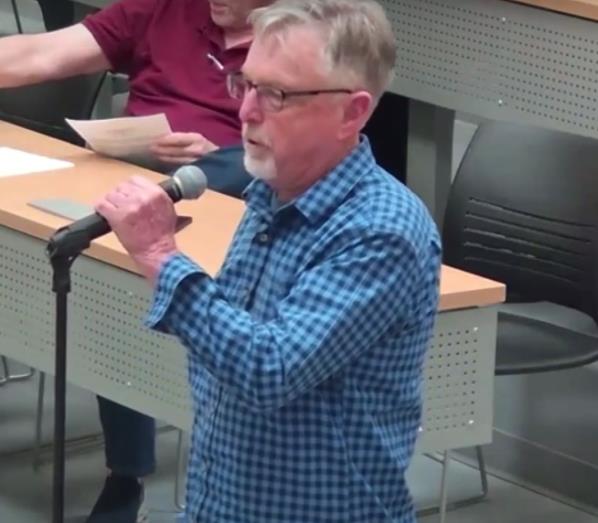
The Board’s public speaking rules prohibit referencing employees by name. Yet none too subtly, several speakers focused their attention on the person at the top, School Superintendent Dr. Luvelle Brown.
“This Board is a lame-duck board,” Michael Hayes asserted. Hayes urged the Board delay any vote on extending Dr. Brown’s four-year contract until new Board members assume office in July.
Last month’s vote was a “signal,” speaker Megan McDonald reasoned. “It’s time to look for a new leader with a different set of skills,” she insisted.
“That budget was out of line, and it had no definition behind it, like we were giving you a blank check,” speaker Jim Meehan told the meeting.
Once the public had spoken, the Board’s budget defenders—most notably, Erin Croyle and Eldred Harris—took their turns at the mic. 15-year incumbent Harris, African-American, was among those voted off the Board last month.
“You want to talk about a contingency budget?” Harris asked, “I want to talk about kids who don’t see a way out, hitting people over the head on the Commons.” Harris continued, “You want to talk about a contingency budget? I want to talk about less of our students going on to college; less being prepared for the workforce.”
Eldred Harris talked of a community—our community—that finds itself “caught in a terrible middle.” Tax-abated developments stand on one side; rising poverty on the other. And “to put this on the heads of children is abnormal.” Harris said.
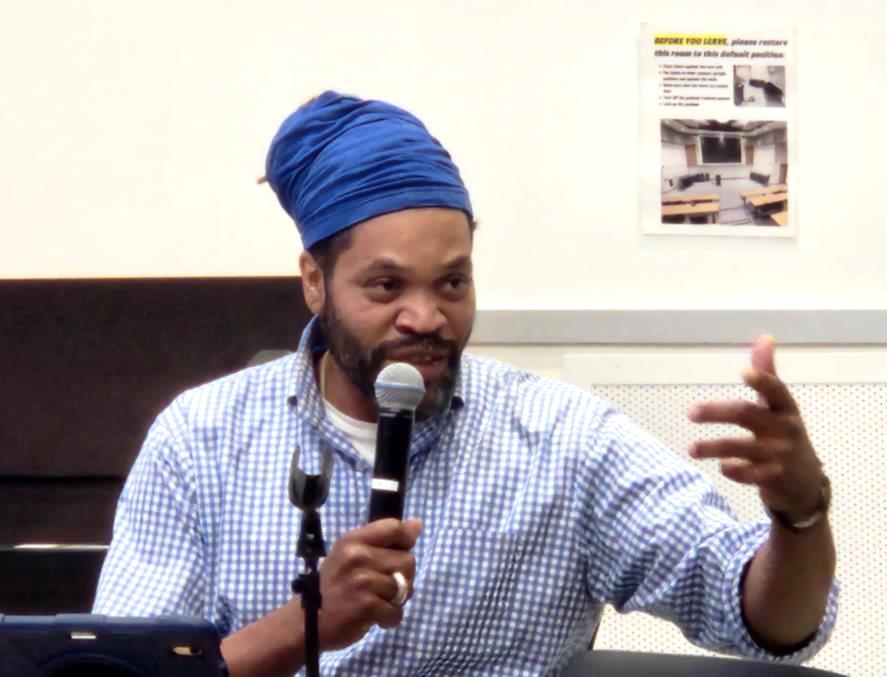
“We are not immune to inflation,” Erin Croyle responded to the community’s cost-conscious budget critics. And reflecting on a recent New York State evaluation that faulted Enfield Elementary as well as both of Ithaca’s middle schools for poor performance, an emotion-bound Croyle declared, “Our schools aren’t failing the students, our society is failing the students.”
No member of the Ithaca School Board Tuesday night had the audacity to resubmit to voters the same budget as they’d rejected by a more than two-to-one margin a week earlier. And although they never voted their formal rejection, Board members tacitly cast aside an option administrators had earlier offered. It would have tied a trimmed-down budget’s increase to the Consumer Price Index. The “CPI Budget” would have hiked spending by 4.1 per cent and the tax levy by nearly five per cent from the current year.
“The clear message that was sent,” Board President Sean Eversley Bradwell said, opining on the voters’ verdict, “was not lost on anybody.” And with those words, he steered colleagues away from the CPI Budget and toward the less-costly one, its levy in line with the tax cap.
And to underscore the Board President’s preference, when District Chief Operating Officer Amanda Verba presented to the meeting her PowerPoint, she’d already scratched a line across the “CPI Budget.”
“A CPI Budget is not tenable at this time,” Eversley Bradwell said. Others on the Board might have thought differently. But no one chose to lobby in its favor.
The tax cap-tied “Revote Budget” will demand administrators cut $5.7 Million in spending from the budget rejected in May. A “CPI Budget” would have required $3.8 Million in cuts. The more austere “Contingency Budget” would impose a $9 Million reduction.
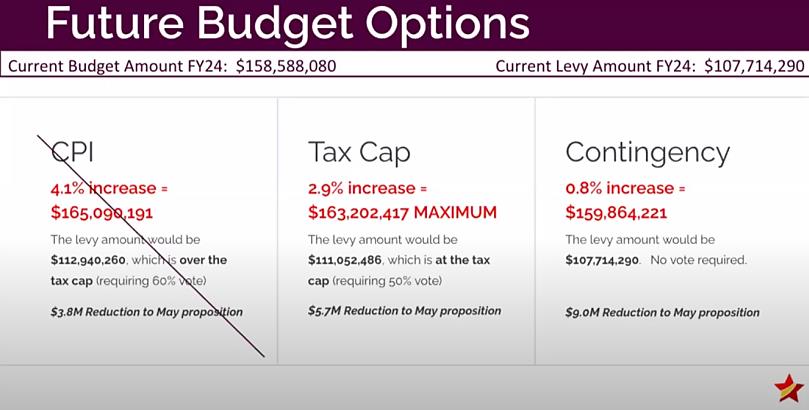
The Tax Cap budget will require only a simple majority to pass in the June 18th referendum. The CPI Budget, like the one previously rejected, would have required 60 per cent approval.
Aside from the 39 teaching positions pared from the earlier budget to support this new one, cost-cutting options administrators propose in the tax cap-tied Revote Budget include a suggested 17-student minimum class size at the elementary and/or middle and high school levels. It’s a limitation that could restrict some upper-class course offerings.
Other economies include a 22 per cent reduction in administrative labor costs, and what Verba called “vacancy control,” pausing the filling of many vacant positions.
“In terms of the executive team, there will be fewer of us,” Verba and Deputy School Superintendent Lily Talcott made clear. Names were not mentioned.
This current year, ICSD has budgeted seven administrators within its topmost ranks. The revised budget would cut them to six. The District currently has 581 teachers in its budget. The “Revote Budget” would trim them to 559.
****
“While this is not a budget I want, this is an absolute budget that I can support,” Sean Eversley Bradwell said of the tax-cap limiting option, admitting quite clearly, that the perfect to him cannot be the enemy of the good.
And if the “Revote Budget” were to go down June 18th, state law would mandate a Contingency Budget take its place. That’s an option the Board President would clearly disfavor.
“I would feel alarmed as a community member well outside of my Board role if we were at a Contingency Budget,” Eversley Bradwell stated. Of such a budget, he cautioned, “I understand the long-term impact probably for a generation.”
Expect the School Board to finalize its budget decision at a special meeting, now scheduled for Monday, June 3rd.
###
Newfield to revise, revote school budget

by Robert Lynch; May 24, 2024; edited May 26, 2024
Tompkins County’s lesser-publicized school budgeting crisis meandered its way toward potential resolution Thursday night. It took place in Newfield.
No, Newfield’s budget defeat in Tuesday’s referendum did not even come close to the taxpayer-driven tsunami of a rejection the Ithaca City School District’s budget also suffered that same day. But a loss is still a loss. And Thursday, the Newfield Board of Education addressed its own, much more closely-drawn taxpayer turndown. It sought a solution.
The school board found that job difficult. For more than three hours, its members questioned staff, weighed alternatives, and agonized amidst fatigue and indecision. And by the time they’d adjourned shortly before 10 PM, the seven servants the district had elected to guide its schools still hadn’t decided exactly what to do. All they’d decided was to put before the electorate June 18th a revised budget of some sort, a budget that might cure enough of the ills of the one rejected by a mere 18 votes two days earlier to secure the support needed to pass.
And as members saw it, a pared-down, voter-approved budget is something better than a bare-bones “contingency budget” that state rules would otherwise impose upon Newfield should nothing else be done.
“Do we have to make a decision tonight?” Board President Christina Ward asked late in the meeting, questioning whether the Board needed to identify specific items to cut before members went home.
“No,” School Business Manager Perry Gorgen answered.
“What stuff are you willing to cut?” departing Board member Shana Claar asked colleagues.
“I feel we do not have any prior significant input as to why people are unhappy,” member Jeremy Tenwolde remarked, his view reflective of the evening’s lack of a firm programmatic march forward.
Tuesday’s Newfield budget loss was narrow, much narrower than the drubbing Ithaca’s much more expensive school budget had received that same day, May 21st. The Newfield Budget lost 248 votes (48.2%) to 266 (51.8%). Ithaca’s had failed by a margin of more than two-to-one.

In the Newfield referendum, a separate proposition, one that would have bought a school bus and a van—the bus either all-electric or diesel-powered—also lost, but by a much-wider margin, 218 votes to 299. Under the proposition’s wording, the bus purchases might have cost the district $556,000 upfront, yet obligated taxpayers only to about $234 thousand because of anticipated grants.
Although the School Board Thursday briefly discussed seeking a revote on the bus, it later killed the idea through its own chosen silence. It took no vote on the bus proposition’s resubmission. After the meeting, Board President Ward confirmed that the inaction meant the purchase was dead.
As the School Board left the budget matter Thursday, it will reconvene in one week’s time, on Thursday, May 30, to decide the extent to which the earlier-rejected $25.48 Million budget will be cut, and also what programs or people may need to be eliminated to accomplish that reduction.
Though Board discussion was often informal and hard to follow, Ward explained later that it had tasked Business Manager Gorgen and School Superintendent Eric Hartz to present the Board May 30th various cost-cutting parameters to produce a projected tax levy increase of between 2.5% and 3.5%. The budget that voters had rejected Tuesday carried the higher, 3.5 per cent levy boost.
Ward acknowledged that the Board may choose to stray outside the general parameters she’d just specified, though presumably any deviation would stray only to the low-side of that range.
After Tuesday’s budget rejection, Newfield’s only alternative to a budget resubmission would be a state-mandated “contingency budget.” Such a budget would curtail expenses further and keep next year’s tax levy no more than this year’s level, $7,181,075. Newfield’s rejected budget would have raised taxpayer obligations to $7,432,413. District spending would have risen by even more, climbing by four per cent.
If the Newfield budget revote on June 18th were to fail, the contingency budget would kick-in regardless.
Newfield’s budget challenge pales by comparison to Ithaca’s. The Ithaca City School District (ICSD) proposed budget of nearly $169 Million, voted down May 21st, would have hiked ICSD’s spending by 6.5 per cent and the tax levy by 8.42 per cent. Cost-cutting options eyed by Ithaca School Board members at a committee meeting Wednesday would have throttled-down tax levy increases to the three-to-five percentage point range.
But if Newfield’s Board must trim expenses, where should it start? Superintendent Eric Hartz suggested that one starting point might be to leave unfilled one or more teaching positions expected to fall vacant this summer. Administrators have identified two such positions in the elementary school, two more at the middle school, two in special education, and two in the music department.
Cutting positions at the elementary level, Hartz said, could raise class sizes there from the present 15-17 students per room range to as many as 20-22. Cutting teachers at the middle school, he warned, could eventually lead to higher dropout rates.
And if music positions at the high school are cut, the Superintendent warned, “That will be a loss of program… there will be some things lost.”
Given State Education Department vocal music mandates, Hartz reasoned that cuts “will more likely be on the band side of it.” Worst case: band could be eliminated.
Figures presented the Board indicated that eliminating each identified teaching position would save $85,000 annually in pay and benefits.
And what about interscholastic sports? Administrators have left eliminating sports offerings as a possibility, especially were Newfield to resort to a stripped-down contingency budget.
Under a contingency budget, “you can still have a sports program,” Business Manager Gorgen told the Board, “But whether we will be able to afford a sports program is an open question.”

Elimination of Newfield’s preschool special education program was also cited as a possible place to cut.
Newfield’s meeting drew a dozen and a half attendees Thursday. They included Tompkins County Legislator Randy Brown. Brown apologized for not having had time to vote in the referendum. Had he done so, it appears the budget’s loss would have been reduced from 18 votes to 17.
“I would have voted for the budget because of the kids,” Brown said during privilege-of-the-floor comments he gave near the start of the meeting.
Brown offered a suggestion he said might improve the budget’s prospects. “I would hope that there would be a much closer connection to the community,” Brown said. “I drive by and see the school empty half the year… It’s gotta’ be known, this is the place to be.”
“Open up the District to more and more people,” Brown urged.
Newfield Board of Education rules permit the public to comment at both the beginning and the end of meetings. Thursday, residents were heard at both ends; their remarks sometimes spirited; occasionally personal. Small community grievances gained a foothold for airing. One man expressed concern that his candid criticism of the budget had been removed from a Newfield Community Facebook page (one not overseen by the school district.) He cried censorship.
“I would like to see some reduction in the levy,” Randy Brown remarked during his own second and final speaking opportunity. Brown suggested a compromise levy increase of one per cent be struck.
But if there was a single, most-emotional moment during Newfield’s arguably overly-long meeting, that moment was owned by Shana Claar, a two-year Board incumbent and a candidate who finished as the odd-person out in this week’s three-way election for two Board seats. Having lost, she’ll leave the Board within weeks. An apt observer could draw striking parallels—both emotional and philosophical—between Claar and another parent-educator, albeit from a different place; Erin Croyle, a young mother who sits on the Ithaca Board of Education.
Shana Claar, like Croyle, had wanted her budget to pass. It did not. When the Ithaca budget was publicly pummeled by taxpayers at a hearing earlier this month, Erin Croyle nearly cried. Thursday night in Newfield, it was Shana Claar’s turn.

“When I brought my children back here, it was because of the programs,” Claar said, holding back tears. “If we don’t provide the programs for students, they’ll move out,” she predicted. “This school is the heart of the community, and if we can’t provide what they need, we will lose so much.”
If Shana Claar was drawn to emotion, Superintendent Hartz was driven to anger. His was anger directed not to Newfield’s taxpayers, nor at the Board of Education, but to the State of New York.
The Superintendent said Albany has yet to provide him a straight answer to his funding questions, important questions this year given the just-enacted changes to aid formulas made within the state budget.
And those who live locally and pay to educate Newfield’s students, Hartz said, have good reason to be angry as well. Their wallets have been drained excessively; funding formulas are anything but equitable.
“I feel horrible to taxpayers,” Hartz said. “The whole system is broken.”
The next piece in that broken system occurs June 18th. That’s when Newfield votes yet again on its school budget. Likely, so too, will Ithaca.
****
(Correction: An earlier version of this story had erroneously stated that the resident accusing censorship was referring to a comment of his posted, then removed, from a Newfield School District Facebook page. A District official informs this writer that the Newfield District does not maintain an active Facebook page, and that the resident was referring to comments made on a Newfield Community Facebook page maintained by private citizens. This writer regrets the error.)
###
Board eyes cuts after big budget loss
No-increase “Contingency” among three options weighed
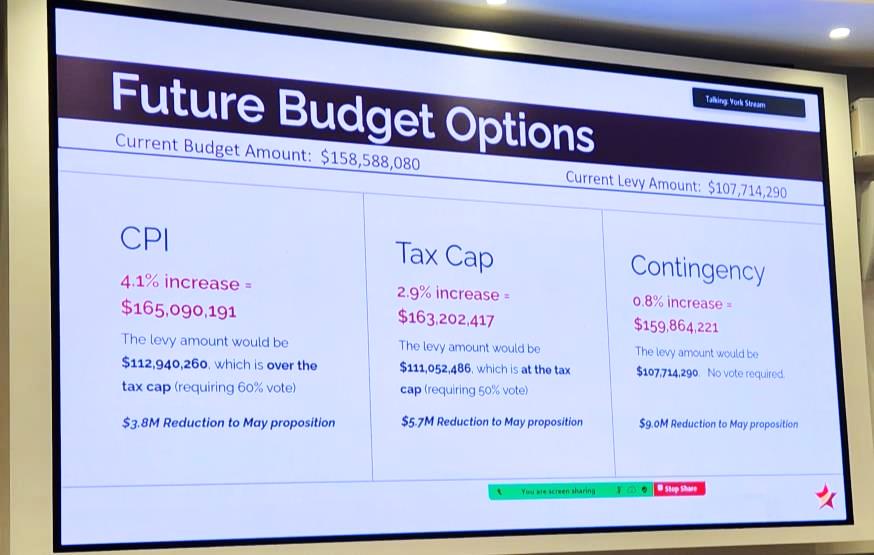
by Robert Lynch; May 22, 2024
Ithaca Board of Education President Dr. Sean Eversley Bradwell stated the obvious at one point in Wednesday’s discussion: We could submit the same budget, he acknowledged, “which would not be wise.”
No, it likely wouldn’t. A proposed $168.9 Million Ithaca City School District (ICSD) Budget for 2024-25 took a whumping in Tuesday’s high-turnout annual ICSD election. The budget, replete with its projected 8.4 per cent increase in the tax levy, lost voter support by a margin of greater than two-to-one; 2,059 votes in favor, 4,916 opposed.
Companion ballot propositions that would have bonded up to $125 Million for a laundry-list of capital projects and separately dedicated $3.2 Million in reserve funds to buy both electric- and propane-powered buses also failed by sizable margins.
Wednesday night, one day after the decisive rejections, the School Board regrouped. It met, as the law requires, to certify Tuesday’s election results. But members also took the opportunity to mull over in committee what to do next.
The certification meeting took just three minutes. But a Finance Committee session that preceded it dragged out far longer than scheduled. It consumed more than an hour. With most every board member in attendance, it effectively became a committee-of-the-whole meeting; one where members could both lick their wounds and also plan what to do next.
“What exactly am I certifying?” Board member Garrick Blalock asked as others placed the perfunctory certification motion on the floor.
“We may not agree with the results, but we need to vote,” Board colleague Karen Yearwood answered.
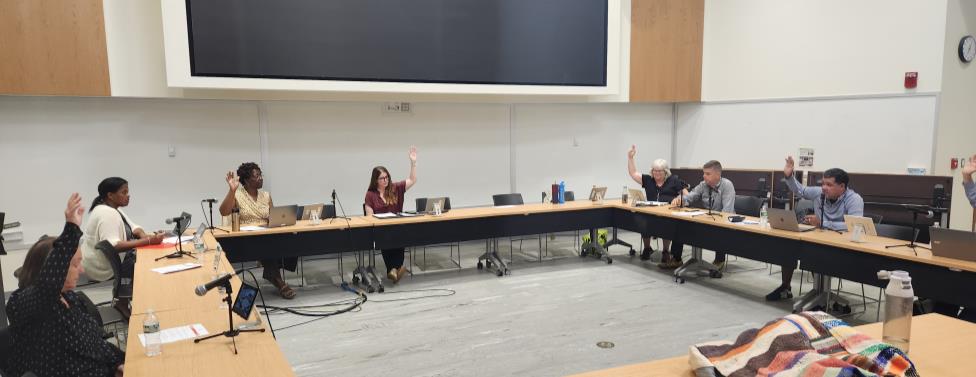
As far as next-moves, the Board made clear Wednesday it’s reading the electorate’s wishes. Board members’ presumed verdict: the rejected budget would have raised spending too high, and with it the tax levy. Even though the Board had trimmed spending and taxes in recent weeks from the plan administrators had first proposed, the budget put to voters would still have hiked spending by 6.5 per cent from the current year, and the tax levy even more, by 8.42 per cent.
This year’s rapidly-rising property assessments, which have tended to inflict pain disproportionately on individual Ithaca homeowners, have only deepened the dreaded tax bite.
“We have a lot to do,” Ithaca Schools’ Chief Operating Officer Amanda Verba began her presentation to the Finance Committee Wednesday. And with that, Verba guided the committee to three potential fallback options. It’s expected that one of those three—or perhaps an amalgam of the alternatives—will be placed before ICSD voters in a second referendum on June 18th.
New York State sets the re-vote date, should any district require one. And to comply with the law, the School Board will need to finalize any revised budget by June 4th. The Board plans to meet on the matter next Tuesday, May 28th. After this Wednesday’s meeting, President Eversley Bradwell said he may even call a special session before that date. And if a final plan can’t be agreed-to by the 28th, another special meeting shortly thereafter could follow.
“These are not the only options,” Eversley Bradwell cautioned the Board after Verba had outlined her three suggested revised budgets. But no member appeared eager to depart radically from the well-defined options the financial expert had presented.
Each would cut spending significantly from the budget that voters just rejected. The most generous among them would restrict spending increases to that of the Consumer Price Index (CPI). It would cut more than $3.8 Million from the rejected budget, but still increase outlays by 4.1 per cent from those of the current year. Its total spending would be $165 Million. The so-called “CPI Budget” would raise the tax levy by 4.85 per cent, down considerably from that of the budget rejected. Nonetheless, as this option’s levy increase still exceeds the state’s tax cap, it would require a 60 per cent super-majority to win approval.
Verba’s mid-ground choice would key the levy’s increase to the tax cap, thereby requiring only a simple majority of over 50 per cent to pass. Its $163.2 Million in spending would climb 2.91 per cent above that for the current year. Its tax levy would rise just 3.1 per cent from that of this year. It would cut more than $5.7 Million from the budget just rejected by voters. The “Tax Cap Budget” would reduce the levy increase by more than half from what the just-rejected budget would have imposed.
The third of Verba’s options would never need to be placed before voters. And should any trimmed-down intermediate option fail at the polls June 18th, this “Contingency Budget” would be forced on the District anyway by state law. The “Contingency Budget” keeps the tax levy rock-solid with that of the current year. The levy would not rise, but spending would inch up a bit, by eight-tenths of one per cent.
A Contingency would slash proposed spending greatly, cutting it $9 Million from what had been put to voters this week, a 5.37 per cent spending decrease. If Board members stand averse to any of the options presented Wednesday, this stood as the one they hated the most.
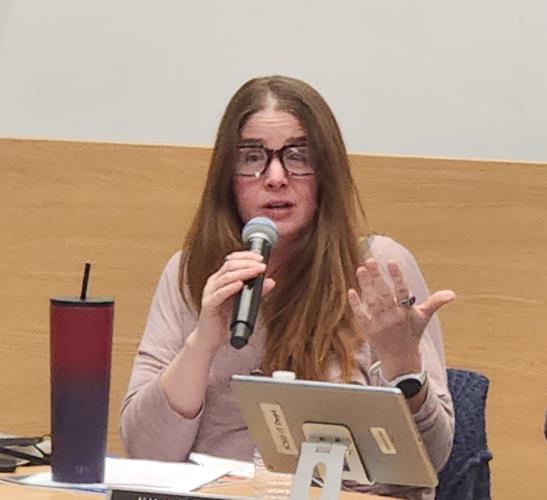
“A $3.8 Million reduction is serious; a $5.7 Million cut is serious; a $9 Million cut is beyond serious,” Eversley Bradwell reacted.
“Contingency would be catastrophic,” Board member Erin Croyle stated. Yet she said the other options would be bad as well. in mid-April, Croyle was the only member to oppose as too stingy the budget placed to Ithaca District voters this week. Instead, Croyle would have offered up School Superintendent Dr. Luvelle Brown’s initial submission, a nearly $171 Million budget with a tax levy hike of 12.14 per cent.
Croyle argued Wednesday that cutting the budget too deeply could affect her district’s ability to make good on plans to raise teacher pay significantly during future contract negotiations.
“We see a mass exodus of high-quality teachers,” Croyle warned.
While the $125 Million capital initiative could also see resubmission to the electorate at some future time—potentially later this year—that resubmission cannot by law come as quickly as the budget revision can… and must.
“Proposition 3 (the $125 Million capital plan), it has its own timetable,” Verba said. “We must wait 90 days to go back to the voters.”
Among the many capital investments the Ithaca District might undertake with its requested capital bonding over the next decade, replacement of the Bostwick Road Transportation Facility has become the firmest project identified so-far. Board members remain inclined to support bus garage replacement. But because of the timing restriction that precludes the bonding proposition’s immediate resubmission, the Finance Committee took little time Wednesday weighing its resubmission prospects.
However, the Board did discuss—with no immediate consensus—whether, and if so, how, to bundle the bus-purchase proposition together with the revised budget in the June referendum. Voters had Tuesday rejected, 2,980 (43.5%) in favor to 3,830 (56.5%) opposed, spending $3.2 Million to buy up to four electric buses and up to four more ultra-low emission propane buses, plus purchase a few other vehicles.
Two schools of thought emerged Wednesday regarding bus purchase bundling. Some members feared the second proposition could drag down the budget once again. Others argued it was best to re-work the lesser proposition—perhaps lessen the number of electric buses requested—and avoid the $40,000 expense of holding a separate referendum later.
“To focus the public’s attention on one vote (just the budget), wouldn’t we be better off?” Blalock asked.
“At some point in time, the district is going to have to play catch-up,” Eversley Bradwell countered, the Board President maintaining that delaying bus purchases this year would only impose added expense during years to come.
With the bus-bundling issue left unresolved, it could return as a focal point during next week’s meeting.
Yet coupled with the depth of budget cutting that faces the Ithaca School Board is the question of Board micro-management in making the painful cuts that will likely occur within the days and weeks ahead. Does the Board assume oversight, or does the Board leave it to Administration?
“What we have heard loud and clear is that this District would like to find some administrators cut,” member Jill Tripp firmly stated.
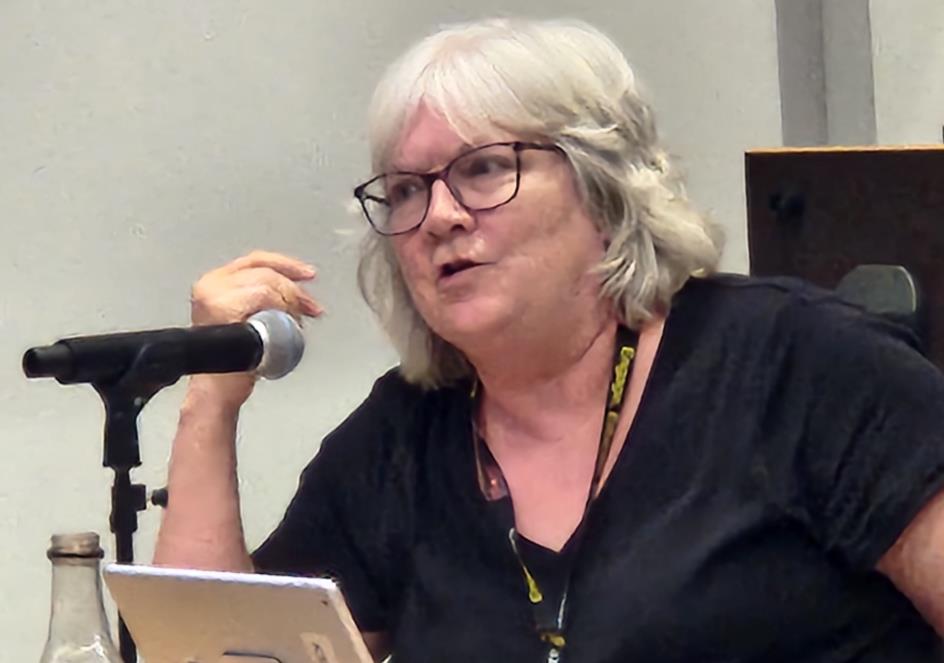
Member Eldred Harris reminded Tripp that leaders have repeatedly advised the Board and public that cuts would come first to administration as those they pay trim staff to satisfy Board-ordered reductions.
“I don’t need an answer tonight,” Tripp responded, “but I’m not very happy that we send it (namely, the prioritization of personnel cuts) back to staff.”
“I would rather not sit at the table and push against individual positions,” Harris rebutted.
“The public does not understand the trade-offs we are facing,” Blalock remarked. The public, he cautioned, sees “a big army of administrators,” an army which may not actually exist.
Eversley Bradwell said he’d rather not get “too specific” concerning staff cuts, suggesting it may be a topic better left to an executive session.
Eldred Harris, first elected to the Ithaca Board of Education in 2009, finished last among seven candidates in Tuesday’s race for three Board seats. Harris’ sadness and frustration surfaced for a brief moment during the Finance Committee meeting he chairs. Eldred Harris strongly supported the budget that voters rejected Tuesday along with him. He faulted tax-conscious taxpayers for thinking of themselves before they consider the students Ithaca must educate.
“They don’t have the community’s best interests in mind,” Harris started openly. “They have their pockets in mind.”
Harris fears the consequences which the voter-directed budget cuts—cuts likely to be finalized within days—will inflict. “We all made our beds,” Harris said. “We’re going to lie in them.”
###
ICSD Budget loses by 2.4 to 1
$125 Million Bond Request and Bus Purchases also lose; Newcomers Workman and Fox oust Board Incumbents Lang and Harris; Krantweiss wins full term
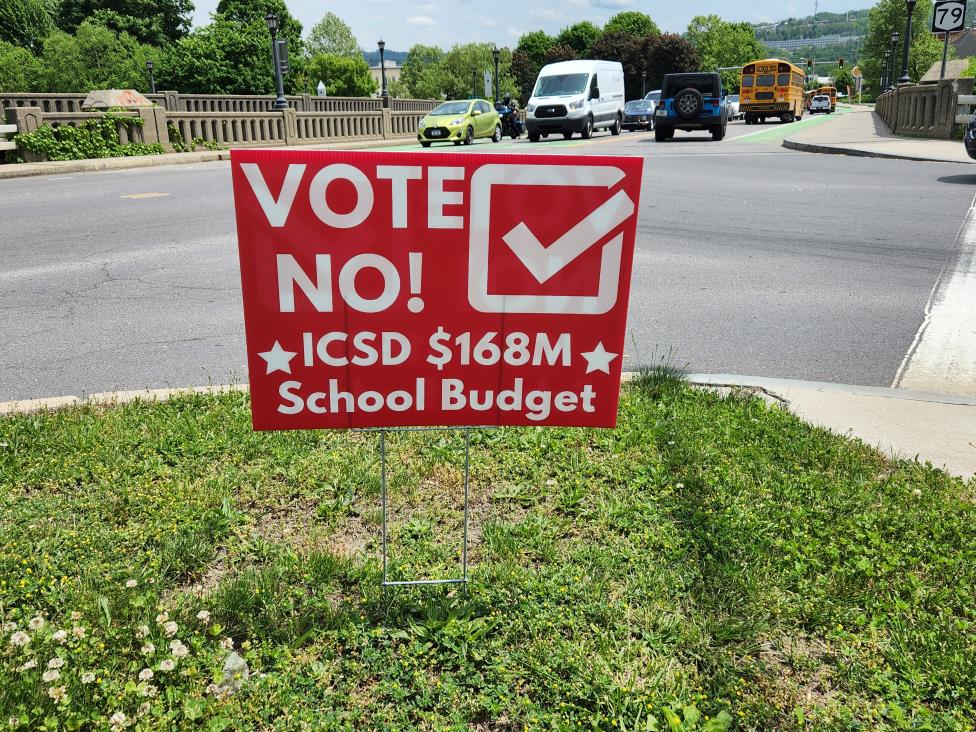
by Robert Lynch; May 22, 2024; updated at 2:15 AM
To many, the outcome may not have been a surprise. But certainly to some, the margin indeed was.
In an atypically high turnout election Tuesday, the priciest and most controversial Ithaca City School District (ICSD) Budget in many years went down to a resounding defeat. The nearly $169 Million spending plan was rejected by more than 70 per cent of Ithaca District voters. Those voters also rejected by a margin of 13 percentage points the District’s proposed $125 Million capital bonding initiative. Similarly losing was a proposal to purchase electric and propane-powered school buses.
And in the race for the Ithaca Board of Education, newcomers Emily Workman and Todd Fox ousted longtime Board incumbents Moira Lang and Eldred Harris. Adam Krantweiss, coming off a shortened term to fill a prior Board vacancy, secured the third seat decided in the election.
Preliminary tallies bore witness to the budget’s landslide loss. Only 2,059 (29.5%) of the nearly seven thousand participating voters approved the biggest-ever spending plan, 4,916 (70.5%) voters opposed it.
In many respects, the election’s returns stand as a repudiation of the current Board and School Administration’s budgeting policies of recent months. They may also serve to question the leadership of Ithaca’s highly-paid School Superintendent, Dr. Luvelle Brown.
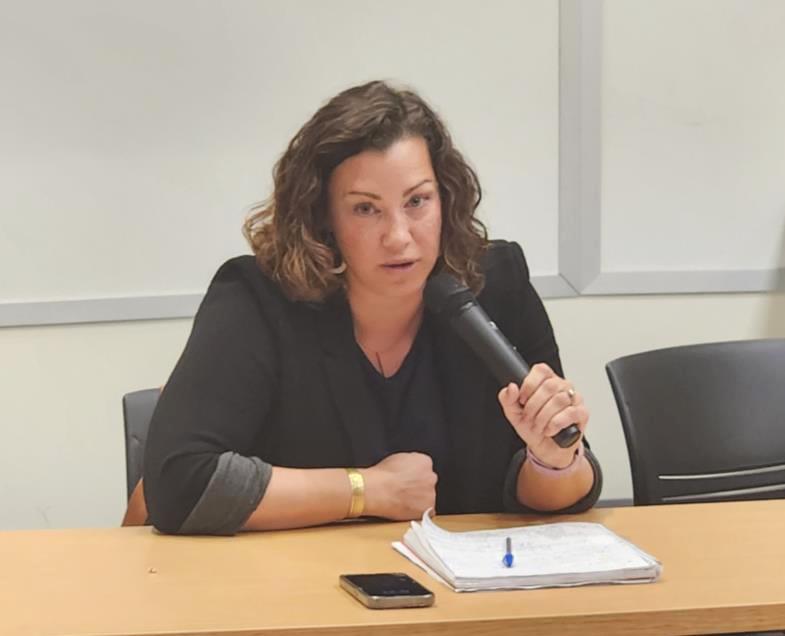
Two of Tuesday’s losers, Board Vice-President Moira Lang and Eldred Harris—Harris the only African-American in the race—were strong supporters of the budget rejected at the polls. Winner Todd Fox, an executive with the Visum Development Group, was openly critical of the budget and had pledged to join those who voted against it.
Fox also said in media interviews that he would not vote to extend Dr. Brown’s Superintendent’s contract beyond its current termination in 2028. Winner Krantweiss was the only member to oppose an extension granted the Superintendent last year. Emily Workman, while noncommittal on lengthening Dr. Brown’s contract, has questioned certain of Brown’s administrative policies.
Of those running, Emily Workman’s margin of victory may have proven the most surprising. A relative unknown outside of the Ithaca District’s innermost education circles, Workman, President of the Northeast Elementary PTA and Vice President of the ICSD PTA Council, secured the largest number of votes, 4,393, or some 63 per cent of those voting in the seven-way race for the three Board seats. Workman secured 440 votes more than the next-closest finisher, Krantweiss.

Among the other winners, Krantweiss, obtained 3,953 votes, according to preliminary results released by Ithaca District offices shortly before Midnight Tuesday. Fox secured the third of the seats up for election, garnering support from 2,805 voters.
Adam Krantweiss has served just one year on the Ithaca Board of Education. He was elected last year to serve out the term of a prior Board member who resigned before her term was finished. It’s said he’s attended most every committee meeting of the Board, even committees on which he was not an appointed member.
Those who won Tuesday’s election will in some instances replace those with significant tenure and name recognition.
Moira Lang, a fixture on the Board since 2015, fell 419 votes short of Fox, and will depart the Board at the end of June. Falling still further behind were former Newfield High School Principal and local BOCES assistant superintendent Barry Derfel (1,879 votes), Steve Cullen (1,608 votes), and incumbent Eldred Harris (1,448 votes).
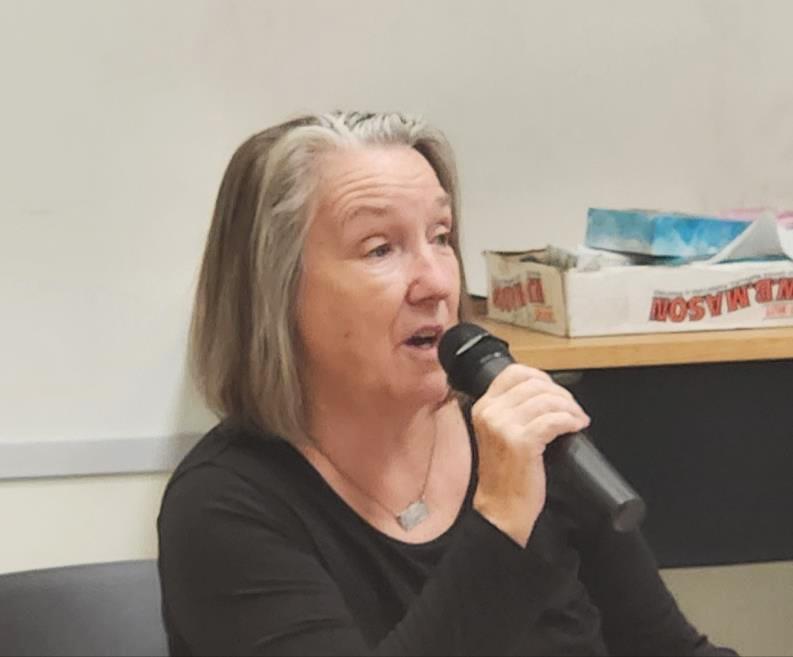
Harris was first elected to the Board 15 years ago. In Tuesday’s election, he may have suffered the most humiliating loss.
Winners Workman and Krantweiss, along with losing incumbent Moira Lang, had entered the election carrying the Ithaca Teachers Association endorsement.
Ithaca District voters Tuesday not only rejected the proposed budget by a resounding margin; they also rejected the largest capital bonding initiative in the District’s history.
Cast aside was a $125 Million capital initiative that would have funded construction of a new Transportation Facility on Bostwick Road, the upgrading of electrical infrastructure at that facility to handle the state-mandated conversion to electric buses, and some $85 Million in largely-unspecified other capital improvements, projects to be undertaken over the next decade.
Though it fared slightly better than the budget, the capital initiative still lost poorly. Voters rejected the capital spending, 3,014 (43.5%) in favor; 3,919 (56.5%) opposed.
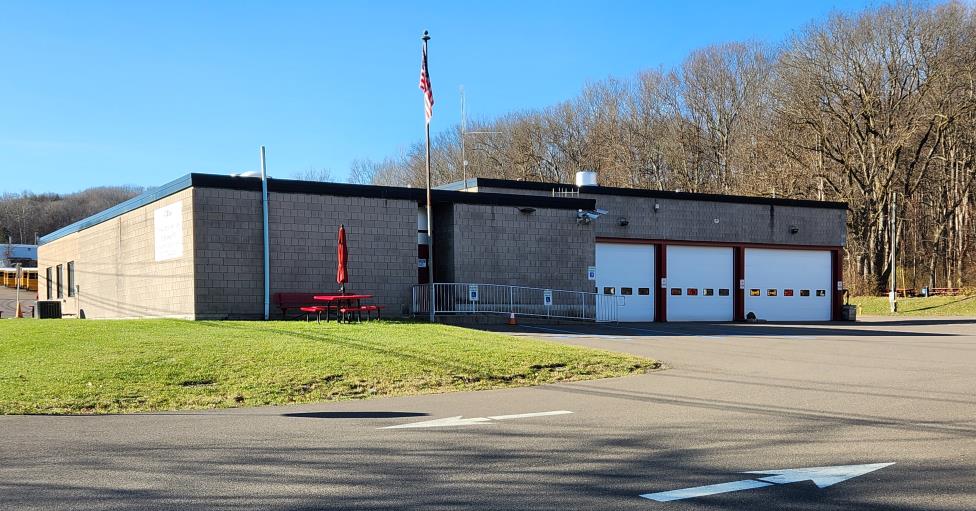
The third rejected measure would have tapped $3.2 Million in capital reserve funds to purchase four electric-powered buses and four low-emission propane-power buses, plus additional vehicles. The bus-purchase measure lost 2.980 votes (43.8%) to 3,830 (56.2%).
Where things go from here will likely be charted beginning with a post-election School Board meeting Wednesday evening (May 22) at District headquarters. Newcomers Workman and Fox will not take their seats until July. The “old board,” so to speak, will still be in charge until then and will decide what next course the budget will take.
State law gives the Board one additional opportunity to revise the proposed budget and hold another vote. Should voters also reject the newly-revised package, a more-austere “Contingent Budget” would become mandated under state law.
A principal formality of the Wednesday night meeting will be to certify the election results. Moving beyond that requirement stands at the School Board’s discretion. District officials stressed late Tuesday that the preliminary election results they’d released “are subject to verification.”
###
The Elephant in the Schoolhouse
Ithaca Board of Education Braces for Budget Defeat
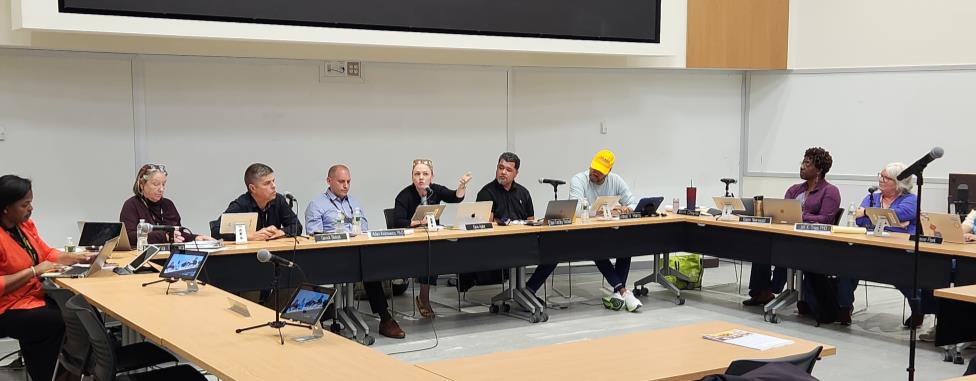
by Robert Lynch; May 16, 2024
Eldred Harris didn’t speak.
The normally loquacious Harris, a six-term member of the Ithaca Board of Education, a candidate in this year’s election, and an ardent defender of spending the money it takes to educate kids, sat surprisingly silent at the Board of Education’s Budget Hearing Tuesday. In the two-hour Board meeting that followed, Harris similarly kept to himself. Something was wrong, very wrong.
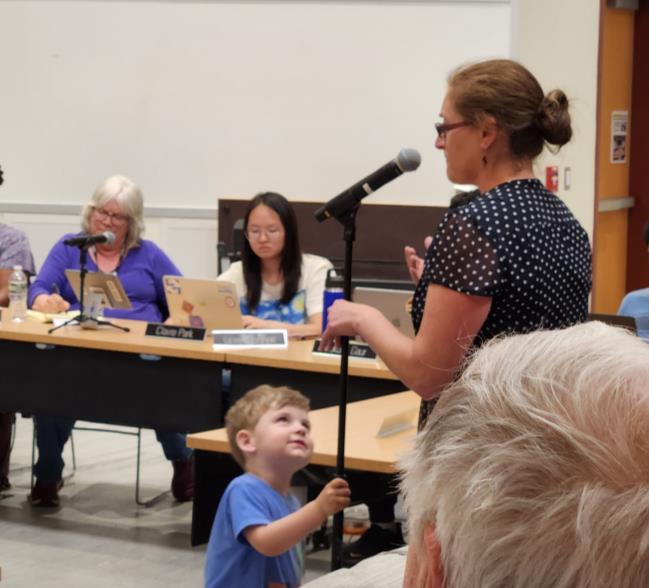
Harris and every other of the nine School Board members had gotten an earful. Most other years, the Ithaca District’s perennially reliable voters, the parents and teachers with skin in the game, leverage budget vote outcomes to suit their wants and needs. With low turnout, they approve budgets by wide margins. But this year, it may prove different.
The masses are mad. They’ve shown it. Tuesday, May 14th, they packed the stadium seating at Ithaca High School’s York Lecture Hall. Many more visited the Public Hearing online. We’re told maybe 100 attended in real time. And after each one of the 20 speakers strode to the microphone and vented his or her displeasure, most others in the room applauded. Not one of those who spoke supported the budget.
“With this budget, you have achieved a milestone,” Ronald Bourse, one of the speakers, proclaimed. “Unfortunately, that milestone is fiscal lunacy.”
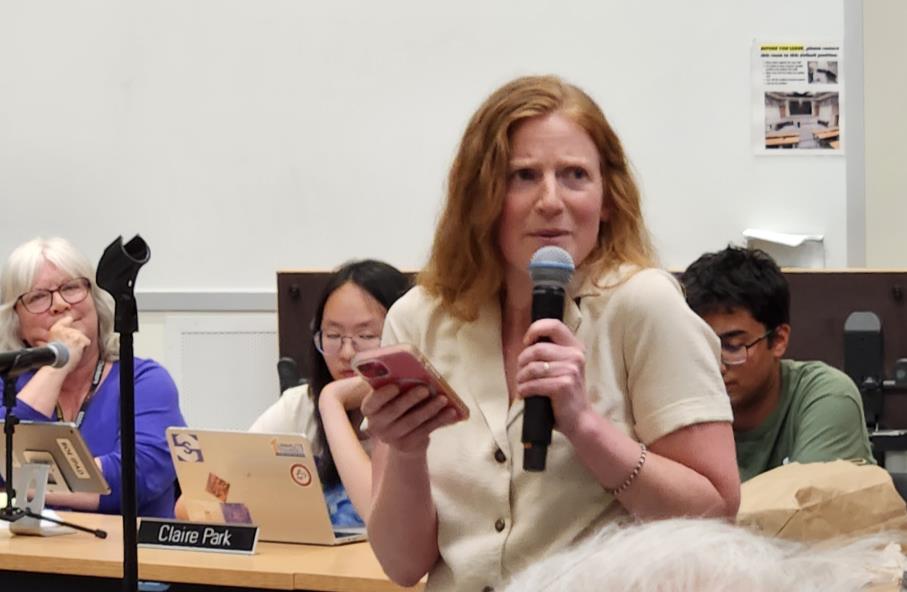
“Seems like the more money we throw at the Ithaca School District, the worse the results,” Barb Herman, another in attendance, told the Board. “It’s unrealistic to be everything to everybody, ”she said. “We can’t afford to solve national systemic problems on the backs of the few taxpayers we have in our district.”
On Tuesday, May 21st, voters in the Ithaca Schools—as well as in school districts across New York State—will decide school budgets. In Ithaca, the proposed budget totals $168.9 Million, up $10 Million, or 6.5 per cent from that of the current year. But Ithaca’s property tax levy would go up by a higher percentage. It would rise 8.4 per cent. It would have risen even more, climbed by 12.1 per cent, had not the School Board chopped $4 Million from the tax levy at a meeting in mid-April.
Ithaca’s voters will also decide next Tuesday a $125 Million capital spending option, the district’s largest-ever. The multi-year bonding authorization would underwrite construction of a new bus garage on Bostwick Road, conversion of the transportation facility to fuel electric buses, and accomplish some $85 Million in building repairs and upgrades, many of them poorly-defined so far. A third proposition would purchase four new electric buses, plus four more that use propane.
By their words, not one member of the Ithaca Board of Education predicted the referenda’s outcome. But members’ body language and their subdued demeanor spoke the words they dared not say: Chances are, the Ithaca School Board’s budget will go down to defeat. And because the budget’s proposed levy exceeds the state tax cap, the budget requires a 60 per cent majority to pass.
School Board member Jill Tripp came the closest that night to tipping her hand to the outcome. And the spectator sitting next to me in the stands that night departed the room voicing to me her assurance that Tripp would vote against the budget herself and would urge others to do likewise. Tripp didn’t really say that. But one could still infer as much from her words.
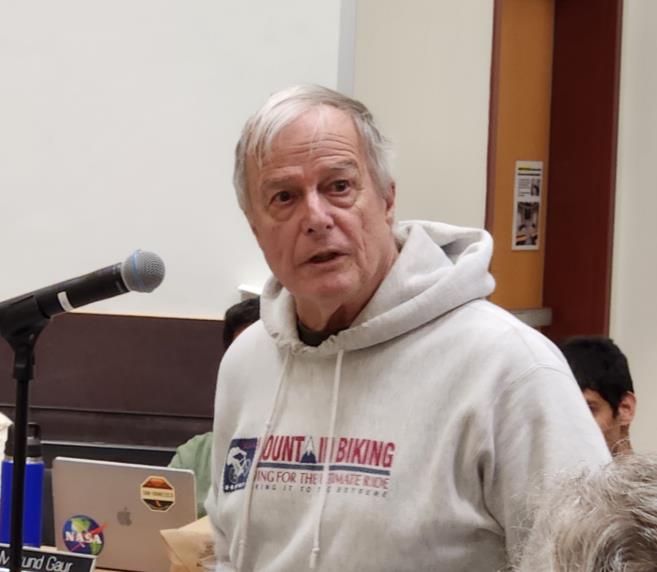
“As many of you know, I agree with much of what you said tonight,” Tripp told her Public Hearing audience. “I think if you’ll stay tuned, you’ll see some changes,” she said. “The wheels of school government move slowly, but they do move.”
Tripp said she agreed with the evening’s critics about high administrative costs, excessive spending, and the need to get Cornell University to contribute more in lieu of tax than it does. Cornell’s avarice became a frequent taxpayer complaint that night.
“You say you’d like to see the budget reworked,” Tripp told the roomful of fiscal critics. “That will happen if you vote down this budget. … May 21st will be our opportunity to know how you feel.”
A bit of background proves instructive at this point. Jill Tripp had floated a financial trial balloon at the Board’s April 16th meeting. No other member thought that night to catch it. Tripp would have cut $6 Million from the budget that School Superintendent Dr. Luvelle Brown had first offered for the Board to approve. At the time, Tripp viewed a Six Million Dollar cut as “not undoable.”
Were the current budget put before voters to fail, it’s safe to say that Tripp may place her reductions back onto the table for reconsideration. Tripp might even cut deeper. Administrators back in April had penciled-in—but nobody on the Board liked it then—a scenario that would slash spending by 20 per cent and undoubtedly cost many jobs.
With Eldred Harris keeping mum during School Board comments that followed the hearing, viewing the flip side of the financial coin was left to his colleague, Erin Croyle. Croyle was the only Board member back in April to oppose the currently-proposed budget. She viewed it as too stingy. Instead, Croyle supported Superintendent Brown’s original $171 Million budget along with its double-digit boost in the tax levy.
“I feel it deeply,” an emotional Croyle, nearly drawn to tears, acknowledged as she responded to vented taxpayer frustration. But as the parent of a deeply-disabled child mainstreamed in the Ithaca District, Croyle refused to back down from the spending levels that she believes make her school system exceptional.
“It’s not a cookie-cutter sort of district,” Croyle said. “And that’s something to be proud of.”
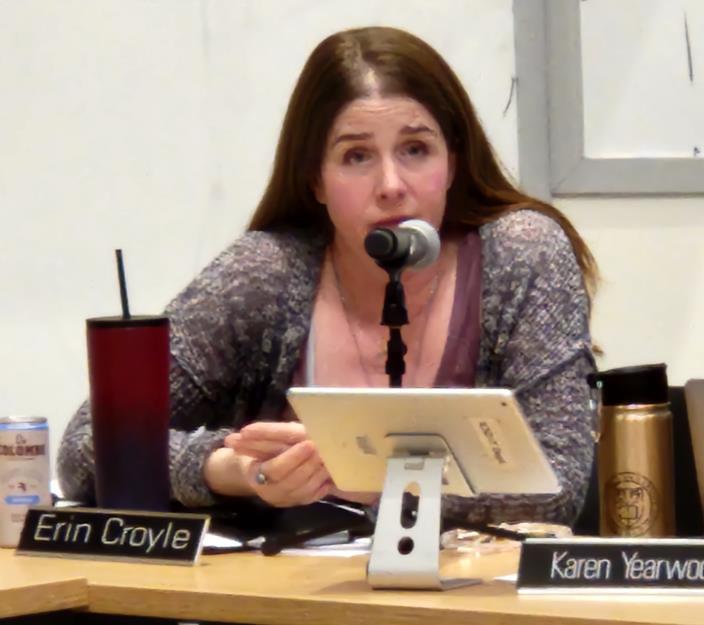
Still, some of those who spoke at the hearing might have preferred ginger snaps to any confectionaries of a more exotic flavor being served to Ithaca’s learners. It didn’t help that one day before the hearing, media reports surfaced that both Boynton and Dewitt Middle Schools—in addition to two elementary facilities—had lost “good standing” with the New York State Education Department.
The schools were cited for poor math scores and pervasive truancy. Enfield and Beverly J. Martin elementary schools lost their “good standing” status last year. For these four facilities, it becomes the equivalent of being put on academic probation.
Both of Ithaca’s middle schools having been newly-sent to the principal’s office in Albany didn’t resonate well with hearing attendees.
“How can we have the 21st highest tax levy increase out of 668 districts in the year 2023-24 and have received such a bad report card for this year?” hearing commenter Henrik Spoon asked.
“Sure would be nice if we get what we’re paying for instead of having four failing schools,” Maddie Turmato told the Board.
“If you throw money at a problem and that’s all you do, you won’t know what’s wrong when things break, and you won’t know how to fix it,” Leigh Rogers stated. “Now it’s up to us to tell the ICSD with our votes that we’re mad as hell, and we’re not going to take it anymore,” Rogers added. “Vote No and demand they do the job that we pay them for.”
“Throwing more money at a problem that is clearly not understood how to solve is a demonstration of a lack of understanding, skill and intellectual capability to do the job of administrators,” Michael Hayes said, echoing a common theme at the evening; that administrators are overpaid, yet clueless.
And commenters gave voice to the often-heard “double-standard” argument: That Ithaca schools cater to the intellectually elite more than to the rest of us.
“We are a public education system acting like a private school for Cornell-bound students,” Kay Minnick told the hearing. With taxes this high, she said, Ithaca will no longer be “multi-generational.” Instead, Minnick predicted, “It will be six-figure folks paying for children of Cornell faculty and staff to receive a private school education.”
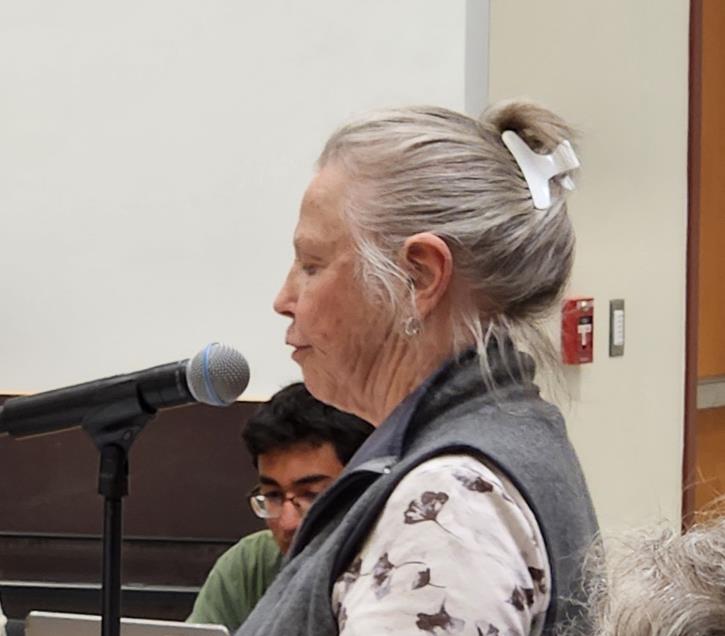
“ICSD appears to be operating a private academy under the vestiges of a public school,” Jim Mann echoed. “I cannot support this budget, and I cannot support any school board incumbent who votes for this budget,” he said.
And that’s a problem. Eight of the nine current Board members voted in favor of the budget that’s being placed before the electorate. The ninth Board member, Croyle, supported even higher spending. Three of the incumbents will seek re-election next Tuesday.
Joe Lonsky, a taxpayer-friendly candidate who’d finished in last place during the 2023 Ithaca School Board election, addressed the Public Hearing. So did Deb Justice, who brought her precocious, three-year-old son along with her. Justice calculated it’s costing her less to send him to Montessori preschool than it costs Ithaca to educate a student.
No one liked the budget. And when Board member Croyle defended the $125 Million capital bonding on grounds that New York State refunds 58 per cent of the money, a shout came from the gallery, “Who do you think the state is?”
There was one shoe that didn’t drop Tuesday night. It was a big one. And had it done so, its thud would have stolen the lead of this story. Remember what Jill Tripp had said as the hearing ended: “If you’ll stay tuned, you’ll see some changes.” Tripp assigned to her words no sell-by date. But one could infer she had implied a time-frame that’s sooner rather than later.
After the Public Hearing, but before the Board of Education held its regular business meeting, the Board entered into a closed, executive session. Board President Sean Eversley Bradwell said its topics would include the “Superintendent’s evaluation.” Eversley Bradwell predicted a 15-minute closed session. It lasted three times that long.
But during the public meeting that followed, only routine business saw action. No bombshells got dropped. Nonetheless, Superintendent Brown availed himself during his assigned speaking time to launch into a seven-minute spirited defense of his administrators, his staff, and his own leadership; as well as to address his evening’s many critics, most of whom had long-ago left the room.

“I’m struggling with the way people can question your humanity and your professionalism without looking in your eyes and without ever having a conversation with you,” Superintendent Brown said to the Board. “And in this role I have, I know that comes with the job; the personal attacks and the questions and the challenges that comes with it, and I’m accustomed to it, and I expect it.”
Dr. Brown didn’t necessarily have to recuse himself from the Board’s head table during the Budget Hearing, but he chose to do so. The Superintendent stood at the back of the visitors’ gallery. If anyone that night wanted to attack a highly-paid administrator, Dr. Brown and his own $269,000 annual salary would stand first on their list. One speaker estimated the Superintendent earns $381,000, counting benefits.
If there is a soon-to-be-written next-chapter to the story of Dr. Brown’s leadership and tenure, it will have to wait until another meeting; a later date.
“The fact is that whatever you think about how many administrators we have, to characterize them as doing it for the money, and being lazy, and not wanting to work, I can tell you I’ve been working with this team for nine years; nothing could be farther from the truth,” Board Vice-President Moira Lang told her audience during Board member reaction to comments on the budget.
Lang got pushback. “Nobody said that,” someone shouted, referencing the accusation that administrators are lazy. Lang had to backtrack, though President Eversley Bradwell qualified that the allegation had came through emails and phone calls members had earlier received.
Lang is among those seeking re-election. She’s served three terms. The teachers’ union backs her.
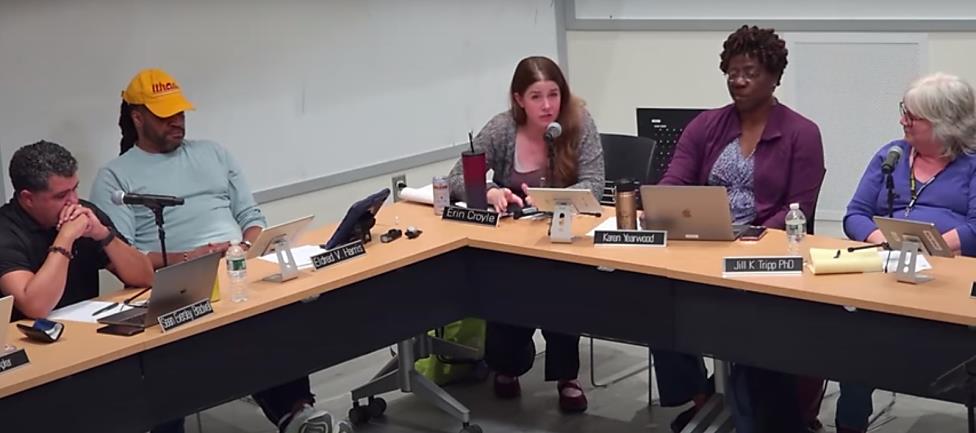
Erin Croyle’s term isn’t up this year. But among the nine who direct the course of Ithaca’s Schools, Croyle showed the most emotion. Quite transparently, hers was fueled by disappointment coupled with the fear of an electorate’s soon to be rendered verdict.
“I feel like I’m hearing the room,” Croyle said as she closed her post-hearing observations. “I’m just going to end because I don’t want to shove my foot in my mouth farther,” she acknowledged. “But I also want to thank folks that did have a little humor, because it helps for me to not cry. This is very hard.”
Erin Croyle obviously saw the political winds shifting at ICSD’s Lake Street headquarters. All the while, Eldred Harris sat at a close right-angle to her at that head table, Ithaca School District cap in place over his waist-length air… and mentioning not a word.
“I do thank you, and we do hear you,” Board President Eversley Bradwell closed the hearing. Voters weigh in next.
(Writers note: This Enfield Councilperson, clearly stating that he spoke only for himself, stood among the 20 who addressed the Ithaca Board of Education at its May 14th Public Hearing. This writer’s opinions focused on the perceived non-specificity of the $125 Million Capital Improvement Bond and his request that the District not demolish its existing Transportation Facility. These comments can be viewed and heard on the meeting video posted at the ICSD website. / RL)
***
ICSD’s Understated “Post-Porn” Debate
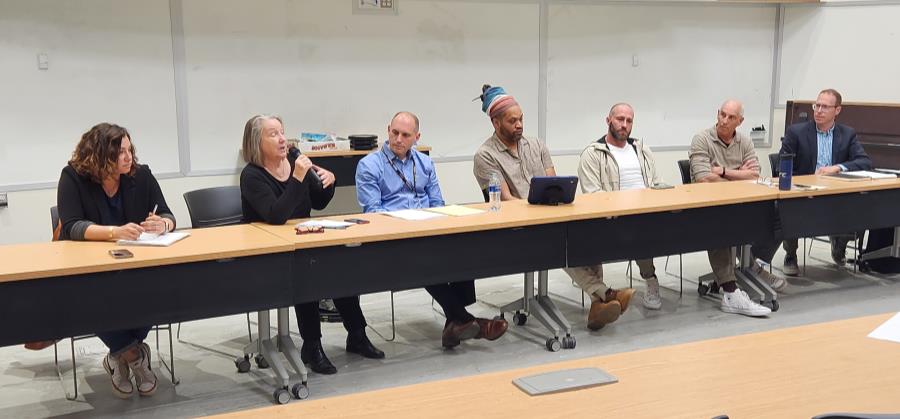
by Robert Lynch; May 13, 2024
Expecting a food fight? It didn’t happen. Anticipating a packed York Lecture Hall full on onlookers to see what happened next? Nope, there were plenty of seats. Only about 20 visitors showed up for what took place Monday night, a number still smaller if you subtracted reporters and other School Board members in the stands.
After the disastrous fiasco of four nights earlier, when an online debate among the seven candidates running for the Ithaca Board of Education reached a sudden, abortive halt after a heckler interrupted Board member Eldred Harris’ opening statement and a looped pornographic video began to play, sponsors took no chances when organizers Monday convened the debate again.
This time, the Ithaca Teachers Association, the forum’s sponsor, held the session in-person at Ithaca High School. Moderators took no questions from the audience. And the ITA promised to play the debate’s video stream only at a later hour, not in real time.
So those expecting a repeat of the previous Thursday night’s drama didn’t find it. The hour-long, tightly-choreographed exchange among the seven competing candidates found itself subdued; perhaps even underwhelming. And if you were craving to see streaks of sunlight shining between those who seek the three positions open in the May 21st School Board election, you had to look real hard to find them.
“Something disruptive happened,” School Board Vice-President and candidate Moira Lang—stating the obvious—said at the forum’s outset, reading from a joint statement that we were told all the candidates had approved. “We are shocked and dismayed,” Lang described members’ reaction to Thursday’s Zoom-bombed disaster. She called what happened “particularly egregious.”

Candidates Monday night may have attempted to lay Thursday’s heckling and X-rated surprises behind them. But they couldn’t. Or, perhaps equally as likely this more recent night, the wrong questions got asked.
Board aspirants were never queried—nor did they truly differentiate themselves—on the Ithaca City School District’s proposed nearly $169 Million 2024-25 budget, the ICSD’s most controversial spending plan in years. Neither did candidates address head-on a companion $125 Million capital bonding initiative, the District’s largest ever. It, too, carries controversy.
What moderators did pose to candidates were questions decidedly on the softball side. Examples: Why are you running? What are your priorities? How will you enhance diversity? Why should voters choose you?
So given the mood of the moment, what resulted was that each candidate attempted to carve out a niche for himself or herself.
Todd Fox, who in past remarks has stated his firm opposition to the budget, talked of his skill as a construction manager. Former Newfield High School Principal Barry Derfel referenced his ability as an educator. Harris, the candidate field’s most vocal supporter of the budget, stressed his support for Ithaca School’s students.
“The only thing I have to offer is my experience in putting kids first and foremost,” Harris said.
But that wasn’t all Harris, the only African-American candidate in this year’s contest, had to say. Media reports indicate Thursday’s online heckling commenced only when Harris began to speak. Whether the online harassment was racially-tinged, or simply political in its motive, has yet to be sorted out. But Harris acknowledged Monday that what was done to him stung.
“I came very close to saying some very angry words,” Harris told this more recent candidates’ forum. Yet then, he added, “I will retreat to my values and make this about kids.”

Candidate Steve Cullen, a business manager at Cornell, said he’s running because of kids as well; first among them, his own. He has three in the Ithaca Schools.
“My daughter was subjected to physical assault at Enfield Elementary,” Cullen alleged when asked why he’s running. I want all students “to reach their highest potential,” he added.
Cullen did not comment further about the alleged Enfield Elementary incident. And later during the evening, he tossed a compliment Enfield’s way.
“As I walk through Enfield School, I see joy,” Cullen said. “And I will carry that torch forward” if elected to the Board.
“I bring folks together to have uncomfortable conversations,” former principal Barry Derfel stated. Derfel may be the only candidate of the seven with his own campaign website. He took pains to reference it not once, but twice.
About the closest anyone got to the hot topic of the budget came when Todd Fox wedged it amidst his touting his own construction management ability as potentially providing the Ithaca Board of Education a new skillset.
“When it’s not your money, it’s always easy to spend it,” Fox said.

Incumbents Moira Lang and Adam Krantweiss—but not Harris—proceed to the District’s election with the Ithaca Teachers Association endorsement. So does newcomer Emily Workman, the Northeast Elementary School PTA President and Vice-President of the PTA Council.
“No policy is going to be effective if it’s not going to be implemented well,” Workman said. And if culture warriors were in search of a target—which they may or may not be—this Workman remark might have raised eyebrows.
“We have banned books all over the bookshelves in the library,” Workman stated with presumed pride, when asked what she’d do to combat racism. “I think that’s very cool,” she opined.
“I am not very comfortable trying to sell myself,” Board Vice-President Lang admitted at one point. But then she made the attempt to do so. Lang talked of her past Ithaca teaching experienced, her “commitment to education,” and the “set of values” she brings amidst the “tremendous amount of work to get done.”
Lang acknowledged the vulnerability placed on her when her educational vision runs headlong into controversy. The solution? “Well, then, don’t run for public office,” friends counseled her.
That’s not possible, Lang said as she now seeks her fourth consecutive term. “I can’t quit to what I’m committed to,” she said.
But the hour-long candidates’ forum, refreshingly civil to the point of near-boredom, circled back to end where it began, namely with the admission that what happened the prior Thursday night in its blue-tinted Zoom room may not have been an isolated incident assigned to one brazen provocateur who spewed anger and disrespect.

“My fear is that we are coming apart as a community, and the crazy is coming back in,” Eldred Harris, prime target of Thursday’s disruptive moment, said as he closed his final turn at Monday’s mic.
“I agree with Eldred,” Emily Workman concurred. “I fear the community is coming apart at the seams.” Yet the PTA leader faulted not just those who might criticize the Ithaca School District from a distance, but also what might be emanating these days from those at the District’s Lake Street headquarters itself.
That seam-stretching, Workman remarked, includes “some of the present communication I have seen coming from the District.”
A few in York Lecture Hall might have wanted this newest, teachers’ union-endorsed candidate to say more of what she meant and to whom she referenced. But Workman saved those observations for another day. The Ithaca District has had quite a lot to digest lately.
###
The Fields amidst the Fuss
Ulysses Planners’ pushback nearly derails Ag. District add-on
Reporting and analysis by Robert Lynch; May 10, 2024
“Our opposition… is not an opposition to agriculture in the Town of Ulysses.”
Ulysses Town Planning Board Chair Pete Angie.
“To over-zone and overregulate farmland, I think, is to the detriment of our community.”
Tompkins County legislator Greg Mezey.

A once-in-every-eight-years renewal of an Agricultural District is the yawner of a news story reporters relegate to the bottom of the pile, should they even cover it at all. But this one proved different.
This one—the renewal of Agricultural District Number 2 on the west side of Tompkins County—plunged the Tompkins County Legislature into 35 minutes of back-and-forth debate Tuesday night. And though Ag District 2 covers tens of thousands of acres and spans five towns, including Enfield, the only point of contention Tuesday was just one little parcel; a miniscule 62-acre slice of hayfield and woods within a mile of Cayuga Lake, land its owner wanted to add to the District’s protective status, but almost couldn’t.
Yes, the fields lie within the Town of Ulysses, the tightly-zoned Town of Ulysses. And to the cynical observer, the answer is, “That figures.”
“Our opposition is not in opposition to the land being farmed,” Ulysses Planning Board Chair Pete Angie told the Legislature Tuesday, May 7th. “It’s not an opposition to agriculture in the Town of Ulysses,” he continued. “It’s really because we want to maintain the unique zoning that protects that area.”
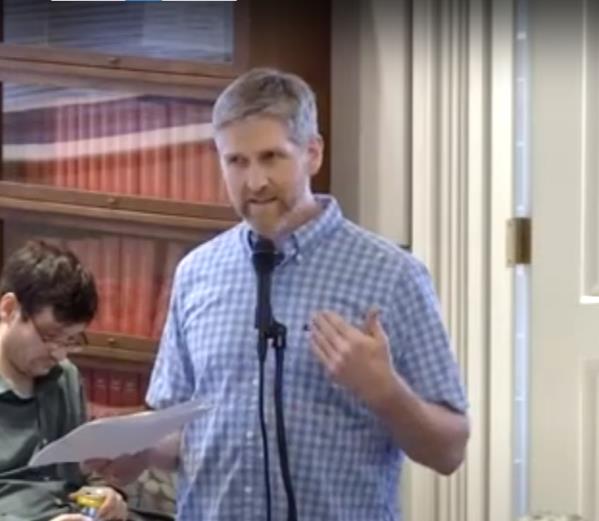
Farmer William Holtkamp and the Tompkins County Agriculture and Farmland Protection Board got their way that night, but not with unanimity.
The County Legislature eventually approved the renewal of Agricultural District 2 with the adjustments the Farmland Board had recommended. The vote was nine-to-four. Before that, legislators rejected, five-to-eight, an amendment that would have struck Holtkamp’s 62 acres from those the Board had recommended be added to the District.
Ironically, Ulysses’ Anne Koreman, the legislator in whose district the controversial farmland lies, was excused from Tuesday’s meeting. In committee, Koreman had opposed the land’s inclusion.
The fields Holtkamp owns at 1618 Route 89 are open and wide, gently sloping, seemingly nothing more fragile than you’d find anywhere else in Tompkins County. But at the heart of the Ulysses Planning Board’s opposition is the fact that the property lies within the Town’s Conservation Zoning District, one in which buildings are limited to 3,500 square feet in size and 32 feet high. Were Holtkamp to build a barn or a silo, that could spell problems.

“This person has owned this property for a long time, he pays taxes on it, and he wants to continue to work (the land) the way it is,” Newfield-Enfield’s Randy Brown, the Legislature’s representative to the Farmland Protection Board, told legislators in defense of the land’s inclusion. “We felt that it was the right thing to do because the owner should have preference over the zoning that came after-the-fact.”
The Conservation Zone is quite obviously Ulysses’ attempt to protect its most cherished natural landmark, Taughannock Falls, and the parkland that surrounds it. But one cannot see the Falls from Holtkamp’s land, nor can one see his farm from the Falls itself. It’s doubtful whether a Falls visitor could hear the farmer’s tractor or his cow, providing he had one there, let alone smell the bovine’s manure.
Yet the doomsday denizen of dreadful industrial agriculture and the evils it might inflict crept into the Legislature’s discussion on whether to deny the 62 acres addition to the Agricultural District.
“Once you put it in the Ag District, it stays there for at least eight years,” Lansing’s Deborah Dawson, a former village Planning Board member, told fellow legislators. “If somebody comes along in two years and wants to put 1,000 head of cattle or 1,000 pigs on that property, which is a whole different kettle of fish from what you’ve got now, they can do that. And that’s what concerns me. And I suspect that’s what probably concerns the Planning Board.”
But for this particular land, hundreds of cows at a feeding trough or swine wallowing in mud seem unlikely, at least for the time being. Crystal Buck, Cornell Cooperative Extension’s Farmland Protection and Ag Marketing Educator, told the Legislature that right now the Holtkamp tract is locked into a multi-year “Conservation Reserve Enhancement Program.” It means the land can be harvested for hay, but farmed for little else over much of the next decade.
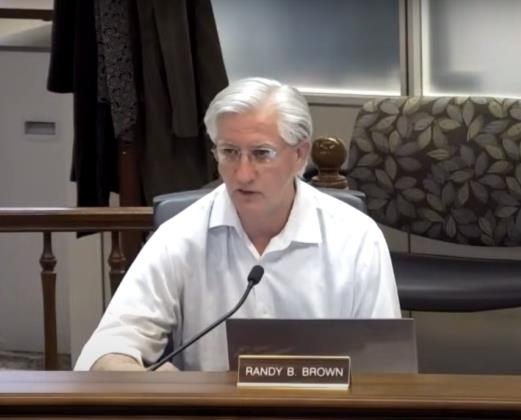
“He wants to protect the farmland, that’s his goal,” Buck said of the farmer’s intent.
Assessment Department records indicate that of the 62 acres, approximately 41 are tillable, 19 acres assigned to woodland. This year the land was taxably assessed at $600,000. Presumably, an Ag Exemption applies.
Nothing else within Ag District Number 2’s four corners registered a whimper of concern at the County Legislature that night. District 2 encompasses some 67,000 acres within Enfield, Newfield, Ulysses, Danby and the Town of Ithaca. As recommended by the Agriculture and Farmland Protection Board, this year’s revisions added 1,229 acres to the district and subtracted 466.
But what transpired at the Legislature Tuesday night—and what occurred earlier in discussions within Ulysses—provides a snapshot at the larger picture. It’s the tug-of-war between anti-regulatory rural libertarian zealots and the anxiety-prone residents who encroach from elsewhere. It’s a conflict not confined to Tompkins County’s northwestern-most town. It manifests itself in the Town of Caroline’s controversial march to embrace rural zoning, and also in the Town of Enfield’s latest initiative to rewrite its Comprehensive Plan.
“The nature of the Town is changing,” Supervisor Stephanie Redmond advised the Enfield Town Board she presides over Wednesday, just one night after the County Legislature took its vote on Ag District 2.
Prodded by both Redmond’s and Enfield Councilperson Jude Lemke’s concerns, the Town Board Wednesday directed it solicit membership in a citizens committee, of open-ended number, to consider Comprehensive Plan revisions. The current Plan was adopted only four years ago. It stresses the need to preserve Enfield’s “rural character.” Dan Walker, Chair of the Enfield Planning Board, said earlier this month that in his opinion, Enfield’s Comprehensive Plan only needs minor tweaks, not a full rewrite.
But back to Ag District 2: “The local jurisdictions are best situated to understand what the local needs are in their communities, what the zoning should look like, what the local resources are,” legislator Dawson apprised her colleagues before their vote. Dawson cautioned that the Farmland Protection Board can make recommendations “from a pretty narrow focus.”
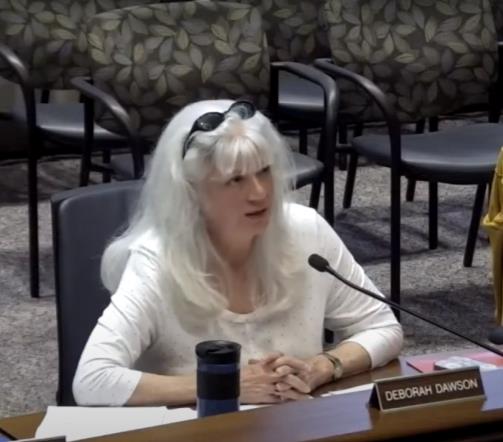
But do six Planning Board members huddled in a room know more than do the rest of us? Planning Board members are unelected volunteers, not necessarily land use professionals. Neither when the Ulysses Planning Board last December 19th voted unanimously against the Holtkamp land’s inclusion, nor the month before when Crystal Buck outlined what might change, did any member of the public take to the podium to offer comment. Planners’ vote in December followed about 25 minutes of free-wheeling banter; members citing this and that, but not with any clear focus.
Board member Rebecca Schneider at one point defended her objection by warning of the “salami tactic.” Slice off pieces of a natural area bit by bit, she warned, and pretty soon it’s all gone.
“There’s steep slopes there, vulnerable soils, there’s a lot of creeks and (it’s) very close to the water,” Board Chair Angie advised the County Legislature as he spoke at this more recent meeting. “Zoning has been created for that zone to help conserve it,” he said.
With the Ulysses fields’ new inclusion in Agricultural District 2, its owner will find it easier to fend off, if not override absolutely, the Town’s restrictions that apply in the Conservation Zone.
The override is not absolute, Buck assured legislators. We work under a “collaborative conversation” with the New York State Department of Agriculture and Markets,” she advised. But when push comes to shove, all agreed, Ag and Markets then pulls rank. The Ulysses’ maximum building size in that zone is 3,500 square feet. By contrast, Ag and Markets’ maximum is 20,000.
A farm’s joining an Ag District “gives up a lot of control,” Board Chair Angie insisted. “It also gives up a lot of protections,” he said. “The idea of what’s unreasonably restrictive zoning is very different in the mind of Ag and Markets than it is in the Town of Ulysses.”

But Dryden legislator Greg Mezey, perhaps the evening’s most passionate advocate of keeping the Ag District the way the Farmland Board had proposed it, posed the counter-argument.
“I’m just curious, how many head of cattle or how many pigs can we put in a 3,500-square foot barn?” Mezey asked. “Is the Planning Board equipped to know that? Are they farm experts? No, Ag and Markets is.”
And Mezey advanced the debate to address a broader question, a question which each town government deserves to ask itself. Who calls the shots here? Mezey’s observation followed Dawson’s statement that the Ulysses Town Board had chosen to “acquiesce” on the property’s controversial inclusion.
“So… the elected level of government, which is the Town Board, does not oppose this being added,” Mezey noted. “I don’t think we’re going over a local jurisdiction because the Town Board hears the advice of their advisory board, the Planning Board, takes that into consideration, and decided not to act on that. And they are the elected officials for the community.”
Deborah Dawson would beg to differ; to give the Planning Board deference, unelected though it may be.
“The Town Board acquiesces,” Dawson acknowledged. “But I will tell you as someone who’s sat on a Planning Board that disagreed at times with the Trustees of the Village, that that happens, because the Town Board, the Board of Trustees do not laser focus on land use the way Planning Boards do.”
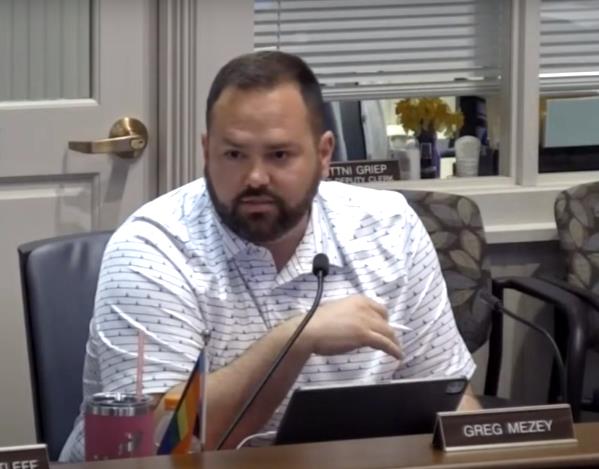
Yet the dividing line between “laser focus” and personal prejudice can prove narrow in local government.
Had William Holtkamp lost his bid for Agricultural District admission, he could still have gone to Ulysses’ Board of Zoning Appeals for a variance to build that proverbial larger barn. He could have continued to enjoy the Agricultural Exemption that reduces his land taxes. And of course, he could still farm. And even within the District, if ever the farmer sold off a piece of his land for a residence, that residence would need to comply with Ulysses’ Conservation Zone rules.
“I think farmland should be protected,” Greg Mezey said. “We have an incredible and increasing food insecurity issue,” he observed. “And to over-zone and overregulate farmland, I think, is to the detriment of our community.”
“I don’t think we need to be as restrictive as we are on potential farmland,” Mezey said. And “I think it’s really important to know and just get out there very clearly that the local elected Town Board does not oppose this being added to the Ag District.”
Democratic legislators Dawson, Travis Brooks, Amanda Champion, and Shawna Black would have amended the Ag District resolution to deny the Ulysses farmer his Agricultural District request. So, too, would have Republican Mike Sigler. Sigler had a different worry. His was that circumventing planning boards could strengthen State Government’s hand in advancing industrial solar installations, a looming interloper to his Town of Lansing.
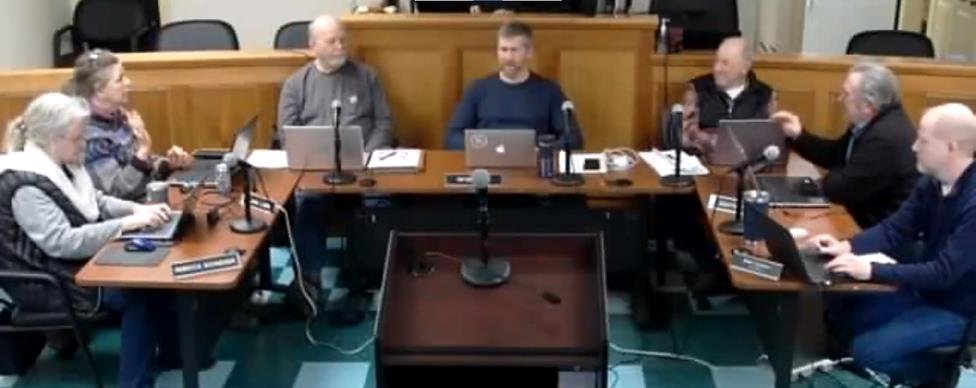
“I don’t want to see the State come in and kind of roll-over local regulators,” Sigler said. “And I would think this would kind of open the door to that.”
But Mike Lane of Dryden would put farmers like Holtkamp in a different category than solar operators. And he would view the Ulysses Planning Board’s excess caution as overblown and unjustified.
“I don’t know of any group that’s more careful about protecting land than our farmers are,” Lane said. “On the whole, they provide the green space that we love about our county.”
“I think if we had a food producer that wanted to come in and generate food and jobs and economic benefit to our community in a responsible way, we should allow that,” Mezey said.
Or mow hay. That’s what’s done every summer at 1618 Route 89.
###
Budgeting with “Discipline”
Tompkins Legislators target 2 per cent tax levy hike for ‘25
by Robert Lynch, May 1, 2024
It’s a time-honored, late-April tradition. Members of Tompkins County Legislature come as close as the law allows to holding a private meeting. There’s no video stream. No one takes minutes. A plastic waste basket wedged to hold open the otherwise-locked door of the County Health Department Building marked the only step lawmakers took to maintain compliance with New York’s Open Meetings Law. No other reporters attended Tuesday night’s legislative “Budget Retreat,” though they could have. It’s not always done, but the County’s Director of Communications issued a five-paragraph news summary the next day. It covered the meat of the moment, but failed to capture its flavor. .
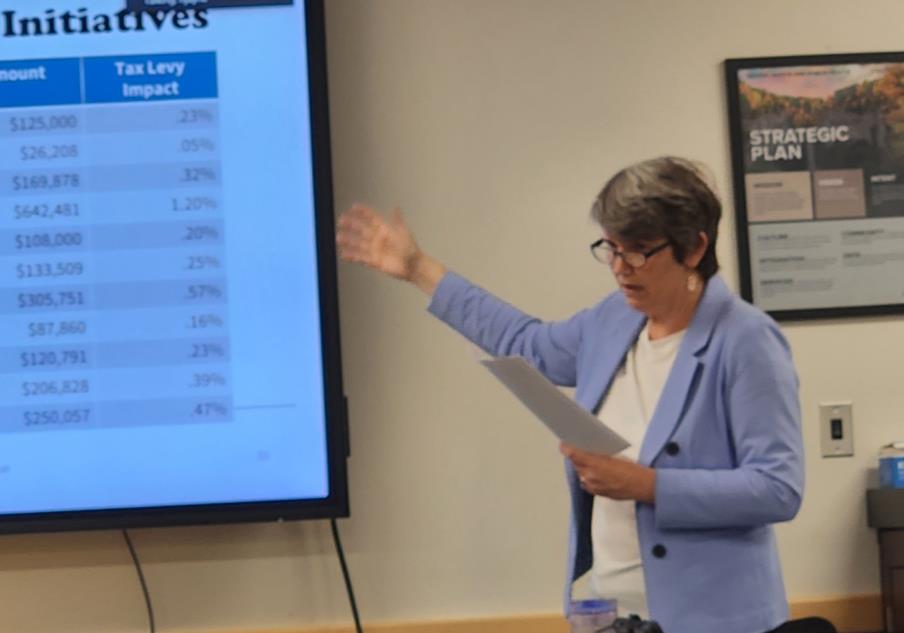
The Budget Retreat becomes the first opportunity for the County Administrator and budget staff to rough-in estimates and brief lawmakers on the upcoming Tompkins County Budget. Administrator Lisa Holmes, who’ll retire at year’s end, did the honors Tuesday night.
And taken in total, her message was somber. A combination of factors, including omnipresent state mandates and surprisingly stagnant sales tax revenues, could bring a 5.9 per cent rise in next year’s property tax levy just to keep in place the programs that already exist.
But legislators didn’t buy it. “I would be appalled if we went out to our constituents and say we go at or above the (projected) state tax cap of five per cent,” Budget Committee Chair Mike Lane remarked at the meeting.
Note that Albany’s predicted tax cap—the one computed for our county’s government—is 5.06%. That’s considerably higher than the close to two per cent tax cap often prescribed. Nonetheless, even this higher cap became a threshold no legislator in the room Tuesday night appeared willing to cross.
Instead, the legislative pushback to Holmes’ budget numbers spoke of frugality. And it foretold of a hectic summer ahead for a lame-duck Administrator and her colleagues on the third floor of the Old Jail Building.
Taking a series of straw polls that carry no official standing, legislators at the Retreat targeted a 2025 hike in the Tompkins County property tax levy of an even two per cent. It would be the same percentage increase by which the County levy rose this current year.
By maintaining the 2025 levy hike at two per cent, administrators and legislators will need to cut just over $2 Million from the “maintenance of effort” budget Holmes presented to the Legislature Tuesday. Just where those cuts will be made across County Government’s more than two dozen departments, lawmakers will gladly let Holmes decide from now until budget season in September.
“We can tell ourselves we have to rein ourselves in, but we actually have to do that,” Town of Ithaca legislator Amanda Champion acknowledged.
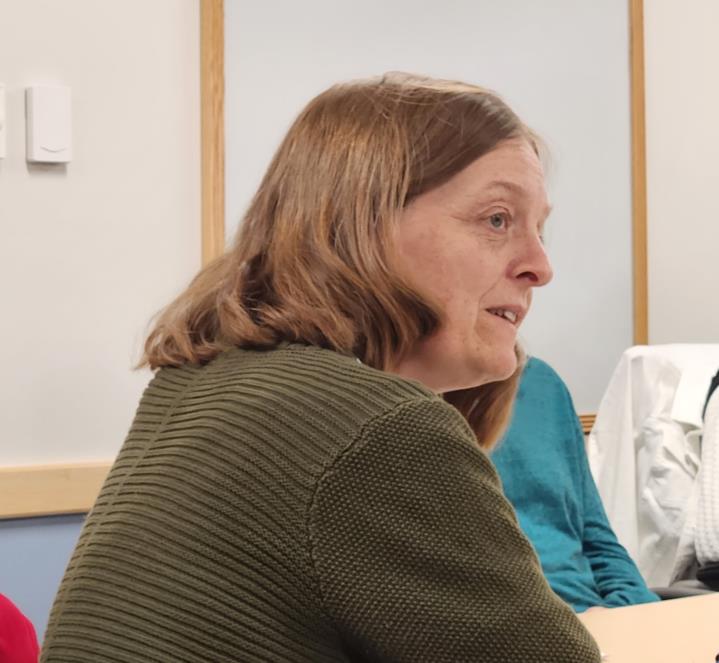
“We’ve gotta’ show some discipline,” Groton Republican Lee Shurtleff counseled his fellow lawmakers.
“We’ve got to cut.” Budget Chair Lane echoed. “And how we get there is the question.”
Getting to wherever “there” is could prove difficult. Department heads notoriously stand their ground on money. And the many agencies that also suck annually on the teats of County Government will want their own usual share too. An effort near meeting’s end to hold agencies to either a two per cent or one per cent increase in their next year’s awards went nowhere, neither option finding majority support.
“This isn’t a year when you’re going to be able to do much magic,” Shawna Black, last year’s Legislature Chair, acknowledged. “This is going to be the year when we’re going to make hard decisions.”
“Prioritization” was the most common buzzword at Tuesday’s Retreat. Black mentioned it. Former Budget Chair Deborah Dawson said it as well.
“Start with the department heads,” Dawson instructed. “Prioritize the programs in your department,” Dawson said she would tell each middle-manager. “This is not a pretty picture.”
Perhaps the perceived privacy of the meeting prompted startling candor. Even the most sacred of the sacred cows in politically-correct County Government did not graze in peace. If not sent to the slaughterhouse, at least one or two were given a budgetary kick in the rump by those with questioning minds.
“We have to look at some of the recent initiatives,” Mike Lane said. He specifically referenced the Reimagining Public Safety initiative, the Ithaca City-Tompkins County collaborative constructed after the 2020 George Floyd killing in response to a long-forgotten Governor Andrew Cuomo dictate. Reimagining has spawned a cornucopia of race-sensitive policing reforms that employ staff, redirect priorities and cost plenty of cash.
Reimagining Public Safety, Lane stated “needs to have a hard look.” That’s all Lane dared say.
The “maintenance of effort” budget that Lisa Holmes brought to the April 30th Retreat would add $3.152 Million to this year’s $53.4 Million County Tax Levy, thereby producing the 5.9 per cent increase. If adopted—and right now, judging from Tuesday’s discussion, it’s not likely to be adopted—Holmes’ “maintenance” plan would add $155 to the tax bill on a median-priced Tompkins County home.
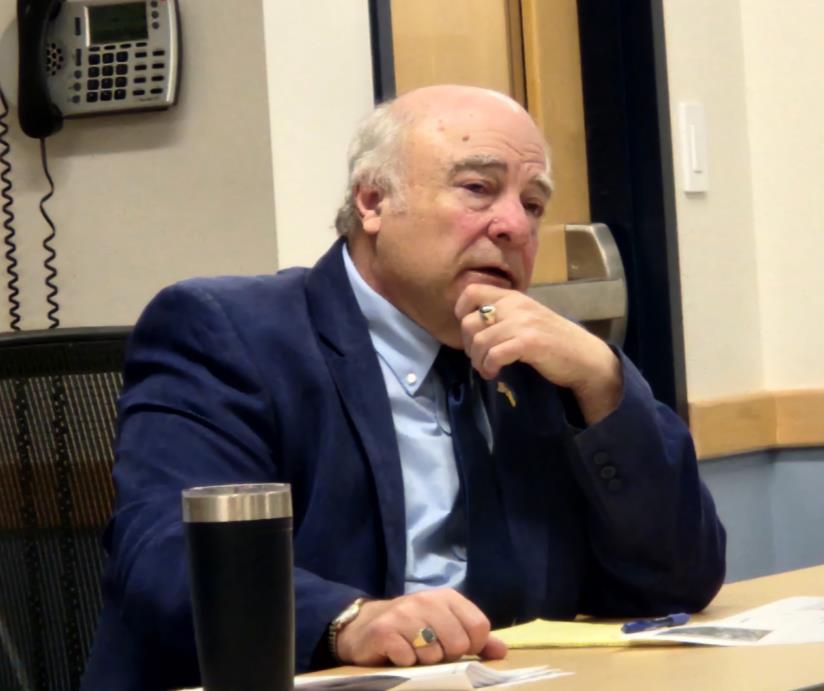
By contrast, a two per cent levy increase would add $100 to the median home’s tax bill. Keeping the levy unchanged from the current year would add $73. Although the logic proves hard to follow, the baked-in increase flows from the fact that housing inflation has raised the median Tompkins County home’s price from $249,000 to $300,000 between 2023 and now.
If a two per cent tax levy increase became the ceiling at Tuesday night’s Retreat, it was not the floor. Some, particularly Dryden’s Greg Mezey, would have cut the levy lower. And Mezey attempted to do so.
“The base line should be what the levy was last year,” Mezey said. “I’m not of the mindset where we can keep taxing, and taxing, and taxing, and taxing, and taxing.”
Mezey joined legislators Lee Shurtleff and Ulysses’ Anne Koreman in opposing the two per cent straw poll consensus embraced by 11 others. Instead, Mezey proposed reversing the current year’s levy increase and cutting the 2025 levy two per cent below what it is now. Mezey’s attempt failed, yet it secured five votes, including the support of Lansing’s Mike Sigler, now a candidate for State Senate.
Losing six votes to eight was a mid-ground attempt of sorts. It would have kept the 2025 levy the same as this year’s. Lane gave up before calling a vote on a one per cent increase.
Newfield-Enfield’s Randy Brown insisted that current budget estimates fail to gauge accurately the strength of Tompkins County’s fiscal reserves. Brown said some money simply doesn’t get counted. Brown also suggested raising the Hotel Tax by one per cent, though any revenue generated from that source would need to be dedicated to tourism promotion.
Among the many drains on Tompkins County resources is the money-losing airport. Holmes’ budget would suck $683,000 from the fund balance to bail out the over-built, but now under-utilized airfield. Brown and others suggested the drain could be plugged in other ways, perhaps through new user fees.
Among the prime cost-drivers to the projected 2025 budget, as Holmes outlined them, were projected employee wage hikes, expected to add $2.3 Million to the budget, or 4.3 per cent added to the levy. The County’s Capital Program would add $1.38 Million, or 2.58 per cent. That capital spending would include continuing first steps toward a $40 Million downtown Center of Government.
And state mandates always proliferate. Some spending, notably in the Department of Social Services, gets locked-in; it remains all that Albany says it must be. And tucked away within the Health Department’s proposed budget is an added $300,000 to cover mandated psychiatric services, described by Holmes as money to care for criminal defendants unfit to stand trial.
In the past, County Government has relied on mushrooming Sales Tax revenue to prop up its budget. For the moment, that may not prove possible. First quarter sales tax receipts this year actually fell more than two per cent from those for the same quarter in 2023. The Administrator’s budget reflected the new reality. It dropped projected Sales Tax revenue slightly.
“I wish that the Sales Tax did not seem to be doing what we do not want it to do,” legislator Rich John remarked. “I’m nervous we may not see the revenue coming in on Sales Tax.”
Rich John’s view of the Sales Tax spilled over to his observation of the “maintenance of effort” budget in general and the sizable tax hike it predicted.
“A six per cent levy increase is very different than what we have done in the past,” John observed. “I think we need to be a little more pessimistic.”

One area where Tompkins County Government may save is in an area where administrators might wish they didn’t have to scrimp. County positions are increasingly going unfilled. The current employee vacancy rate, Holmes reported, is 12.5 per cent.
“It’s a function of the low unemployment rate and the shortage of workers,” Holmes said.
Holmes’ projected budget assumes a five per cent vacancy rate for the year ahead, up from a two per cent vacancy forecast for 2024.
Some legislators, like Mezey, saw a silver lining in that vacancy cloud. With positions open, people aren’t drawing paychecks. Raising the vacancy projection to reflect current reality, up to maybe 12 per cent, they argued, could shave burdens from the budget.
Lisa Holmes’ “maintenance of effort” budget, even with its 5.9 per cent tax hike, wasn’t even the most expansive (and expensive) option put before legislators Tuesday. It had its bigger cousin, the “beyond maintenance of effort” alternative. The “beyond” budget would tack on largely-unspecified additions like supplemental aid for the TCAT transit service, additional support for TC3, and cost-of-living adjustments for nonprofit agencies. This larger budget would hike the tax levy by as much as 6.24 per cent. Reading the room Monday, consider this pricier alternative dead on arrival.
Every vote taken by legislators Tuesday night went officially unrecorded. It carried no true standing. Much could change between now and September when real legislative budget crunching begins. So the two per cent levy benchmark much touted Tuesday could be cast in cream cheese, not stone.
It was the Budget Retreat’s tone that proved most meaningful. At least for the moment, at the Tompkins County Legislature, frugality is “in;” extravagance is “out.”
“We’re going to look at trimming down our government,” Shawna Black admitted. Time will tell if Black’s pronouncement holds true.
###
Dan, the Cable Guy
Enfield taps Pittsburgh hired gun to haggle with Haefele
Reporting and Analysis by Robert Lynch, April 24, 2024
Enfield’s ten-year cable TV franchise with Haefele Connect has run out. Why someone forgetfully let it expire 18 months ago is a question all its own deserving an answer. But a more pressing inquiry at the moment is how we, Town Government, should negotiate a new Haefele agreement.

This Councilperson would prefer direct, across-the table, face-to-face discussions with owner Lee Haefele and his staff. That’s how it’s been done in the past. But that’s not how the Town Board’s majority wants it done now. Everyone but this writer demands that the Town of Enfield speak only through a high-powered, Pittsburgh-based law firm. The majority will prevail. The lawyers will move in. And one way or another, you, Enfield’s taxpayers, will pay the bill for them and suffer any consequences they inflict.
“Getting outside expertise is just wise,” Supervisor Stephanie Redmond argued before her Town Board April 10th. “When you’re not highly educated on the subject, you look for outside expertise. That is a matter of best interests of the Town,” she insisted.
By a vote of three-to-one, with this Councilperson, Robert Lynch, a determined and opinionated dissenter, the Enfield Town Board April 10th engaged the Cohen Law Group of Pittsburgh, and its principal, Dan Cohen, to negotiate the Haefele franchise renewal. The Cohen firm specializes in cable negotiations for municipalities. Dan Cohen served on the Pittsburgh City Council for a dozen years. He claims to have led efforts to regulate cable rates in that city, an initiative that led to FCC-demanded rebates for cable subscribers there.
Cohen Law purports to have helped more than 500 local governments over six states negotiate cable agreements. As approved by the Town Board this month, Cohen will charge Enfield a flat $8,900 fee.
“Franchise renewal is the best opportunity for the Town to obtain significant benefits and assert its legal rights with its cable operator,” Cohen Law stated in the second paragraph of its ten-page engagement proposal. The letter, itself is as long as the most recent franchise agreement between Enfield and Haefele. “Our objective will be to negotiate a new franchise agreement that addresses the changes since the last franchise and secures increased financial and legal benefits for the Town,” Cohen’s pitch to Enfield stated.

The company now known as Haefele Connect, based in Spencer, NY, began stringing TV cables through Enfield in 1984. Initially, it limited its service to homes along NY Routes 79 and 327, serving only Enfield’s residential backbone, with a few excursions up adjoining roads. The initial franchise reported a “basic service area” of 321 homes. Today, Haefele reaches the vast majority of Enfield residences.
Haefele’s initial 10-year contract with Enfield in 1984 carried a 5-year renewal option. Subsequent renewals occurred in 2001 and 2012. The Town Board’s 2012 meeting’s minutes reported that Enfield’s long-time municipal attorney, Guy Krogh, had first reviewed the final draft handed him by then-Supervisor Roy Barriere. Krogh had suggested minor changes and then handed the contract back. Quite likely, Barriere and Haefele had negotiated the agreement by themselves.
On October 10, 2012, Roy Barriere opened the required Public Hearing on the proposed ten-year Haefele contract. No one from the public spoke. Barriere closed the hearing three minutes thereafter. Later in the meeting, the Town Board, after limited discussion, ratified the contract unanimously.
But that was then; this is now. Stephanie Redmond, not Roy Barriere, now leads the Enfield Town Board.
“So after talking with Cohen Law, it appears that we have missed out a lot,” Redmond told the Town Board on this most recent April night. “And we could have been having income of over $50,000 a year, based on some of the things that he was mentioning.”
The money Redmond talked about is commonly referred to as a “franchise fee.” It’s a percentage of a cable operator’s gross receipts forwarded as revenue to the Town. The 1984 and 2001 Enfield agreements had each imposed a one per cent (1%) franchise fee on Haefele’s service. The 2012 agreement did not. Operators tack franchise fees onto subscribers’ bills.
“I’ve contacted all the other town supervisors around. They’re all getting franchise fees, and they’re all getting other kickbacks,” Redmond told our Board. “We are not getting anything like that, and to the tune of like $50,000 a year, which I know our pocketbooks could really, really enjoy.”
The Supervisor also claimed that with wise, skilled counsel, Enfield may be able to twist Lee Haefele’s arm to extend cable service to Enfield’s still-unserved areas, even though federal regulations customarily limit a municipality’s leverage over a cable operator to the television side of its business, not to the realm of broadband Internet.
“Three times in our Town’s history, we have negotiated contracts,” I informed the Board regarding the Haefele agreements, “and we have done it in a very non-confrontational and collegial way with a very good small business that provides better cable service for this Town than most other towns and the City of Ithaca enjoy.”
Among cable TV service providers in Tompkins County, Haefele in Enfield stands as the outlier. For Ithaca and most other places, Charter-Spectrum is the dominant hard-wired operator. It’s the largest multichannel video service provider in the nation. Spectrum’s higher rates, monopolistic conduct, and notorious poor customer service are demerits best not inflicted upon Enfield’s residents.
Spectrum is “way too much money for way too little, and it’s unreliable,” Dryden Town Supervisor Jason Leifer famously told a Tompkins County Council of Governments (TCCOG) meeting in August 2021. Leifer hasn’t changed his mind since. Dryden has launched its own municipal broadband service as a head-to-head competitor with Spectrum. At an earlier 2021 TCCOG meeting, shared results of an online customer survey gave Haefele Connect a 3.7 rating on a scale of zero to five; Spectrum-Ithaca a mere 2.3.
“We’ve got a good cable provider, and I don’t want to mess it up,” I told the Enfield Town Board during our 13-minute pointed go-around before we voted on Cohen Law’s engagement. “I don’t want to lawyer this up where we’ve got to have a hot-shot Pittsburgh attorney going down and talking with Lee Haefele. He’s going to have to get his attorney, and it’s going to get all lawyered up. And pretty soon, I fear, Lee Haefele will clap his hands and say, ‘That’s enough, Enfield; I’ll sell it to Spectrum,’ and then we’ll be stuck with Spectrum.”

“We are not negotiating this contract with Spectrum. We are negotiating it with Haefele,” Redmond apologetically responded, her counter-argument quite obviously missing my point. Redmond said the person she spoke to at Cohen Law showed no inclination to “stick it to Haefele.”
“I don’t see this as an acrimonious discussion,” Enfield’s Supervisor maintained. “I see this as we’re just updating their franchise agreement that’s sorely in need of updates.”
Just what kinds of revisions, outside of imposing a franchise fee, Redmond failed to specify that night.
“There was a lot with this that he was going through that—I mean, I don’t even know the language of it,” Redmond conceded following her Cohen conversation. “And I don’t even know the different types of, you know, bandwidths that are out there,” the Supervisor qualified. “That’s not my expertise.”
But in Redmond’s opinion, past home-grown franchise negotiations were much too hurried, too non-critical, and too deferential to the cable operator. The Town Board in 2012 “considered what seemed easy,” Redmond concluded. And when she most recently presented to Krogh and Cohen the now-expired contract (the one Krogh had signed-off on a dozen years ago), they were each quick to fault it.
“Both Guy and Cohen looked at it and went like, ‘Whooo, you guys have been going off of this for the last ten years, huh? It isn’t that good.’”
“Where are the complaints from the people in Enfield?” I offered the Supervisor in rebuttal. “I have not heard one person complain about cable TV service in this town. There are a few people who’ve been complaining about the fact that broadband doesn’t go everywhere. Guess what? Every town in Tompkins County has that problem.”
Later during the April 10th meeting, the Enfield Town Board endorsed a Resolution supporting an effort for Tompkins County to spend $100,000 toward launching a program aimed at filling in broadband Internet’s gaps county-wide, including in Enfield. The Tompkins County Legislature approved the expenditure April 16th and established a partnership with Point Broadband to serve the identified unserved areas. In Enfield, Point Broadband would likely contract with Haefele to string the cables and provide the service.
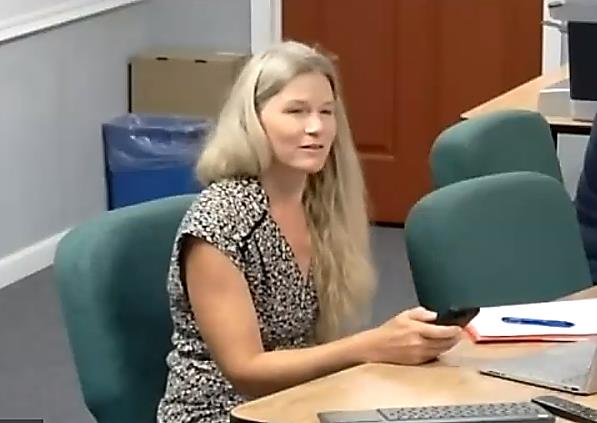
The lure of franchise fees stood most on the mind of the Town Board’s majority during the April meeting. Supervisor Redmond and this Councilperson carried most of the discussion. Councilperson Cassandra Hinkle participated minimally. Colleague Melissa Millspaugh, at home with a new baby and attending remotely that night, remained quiet. Yet both Hinkle and Millspaugh joined the Supervisor in supporting Dan Cohen’s retention. The remaining Board member, Jude Lemke, excused that night, had in a prior meeting expressed her support for specialized legal help in the franchise talks.
“We talk about all these franchise fees,” I reminded the Town Board that night. “Those franchise fees get tacked onto the cable bill. They are nothing more than an excise tax. You’re not drawing this money out of the cable company’s own resources. You’re taxing our residents, and a very regressive tax to boot,” I continued. “Because no matter how nice a house you have, how expensive it is, how much income you have, you’re still going to pay that same $3, $4, $5-a-month to the Town of Enfield as a tax.”
But dollar signs aside, the retention of Cohen law so much departs from past practice. I quoted to the Board from Page 3 of Cohen Law’s pitch to Enfield:
“CLG has developed a three-step approach to cable franchise renewal projects. The first is to identify the client’s specific needs…. Second, we negotiate firmly and deliberately with the cable operator in order to reach agreement in a timely fashion….” (The third step is cost-effectiveness for the client.)
“Firmly and deliberately; that means adversarial,” I stated to the Board as the irrefutable message.
“He’s going to talk to us first” Redmond replied softly. “And we can say, ‘Hey, we really like Haefele. Can you be very friendly with negotiations? We really like them, and we want them to stay.’ They can say all those things.”
“I just think it’s really important for us to have someone that has expertise in the field to give us all the information that we need that we don’t have, nobody on this Board has,” the Supervisor assessed.
“This is $8,900,” this Councilperson reminded everyone who cared to listen. “By voting for this, Resolution tonight, we’re committing the Town to spend $8,900 that I can’t spend in good conscience.”
****
Town Board majority votes carry a collective voice. Yet no individual Board member ever loses a voice of his own. After the 3:1 vote, this Councilperson informed the Board he would attempt his own meeting with Lee Haefele or his designee to revive the strategy that seemed to work so well in the past and discuss informally with the owner where cable talks should go.
“Destroy everything before it even starts,” Supervisor Redmond muttered, mostly under her breath. “This gets us off on a really nice foot. I hope you have a really wonderful discussion.”
The Town Board that night then went on to other business. We still have cable—and Haefele—for now. We also have a legal bill to pay.
###
View more local stories posted under “Latest News”

